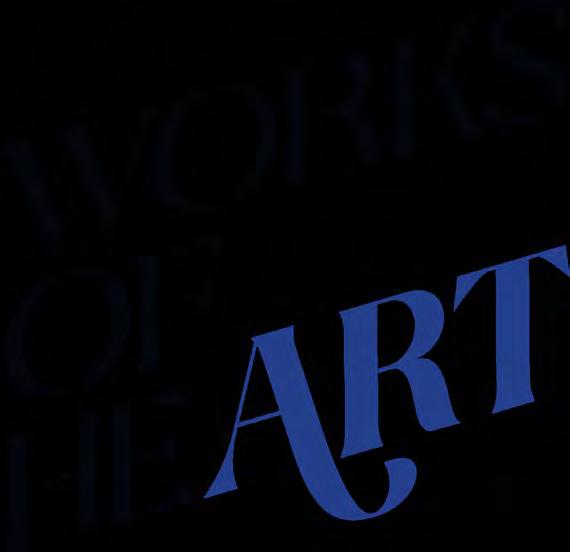




















Get convenient care on the go. Located at the Salesforce Transit Center, Care Essentials by Kaiser Permanente is an easy way to get quick, high-quality services for minor health needs.
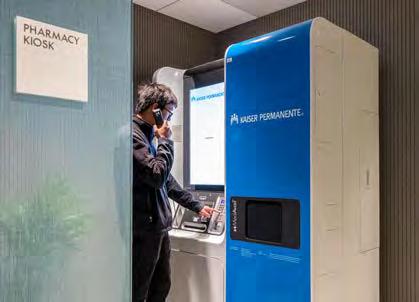

You can walk in or make a same-day appointment for care. Plus, get a lab test during your commute, fill many prescriptions on your way out the door, and take care of your health without missing a beat.
At Care Essentials, you can expect the same high-quality care you get at any Kaiser Permanente facility — connected and streamlined to fit your life.
Walk, bike, or ride to:
Care Essentials by Kaiser Permanente


Downtown San Francisco


Salesforce Transit Center 425 Mission St., Suite 200 San Francisco, CA 94105
Get convenient, high-quality service for:
Minor illnesses or injuries
Lab tests and screenings
Many prescriptions and medications
Flu shots, injections, and vaccinations
Pregnancy tests, birth control, and more
Emergency care services are not available at this location.
Find out more, including a full list of services, at careessentials.org. 415-833-2200
Introducing Care Essentials by Kaiser Permanente, Downtown San FranciscoIn the East Bay race for the open 20th Assembly District seat, gay Dublin City Councilmember Shawn Kumagai is trailing in his bid to become the first LG BTQ state legislator of Japanese descent. He is one of a dozen out legislative can didates in California awaiting final results from the November 8 general election.
Kumagai mounted a tough election fight against labor leader Liz Ortega, who is straight. She had the endorsement of outgoing Assemblymember Bill Quirk (DHayward), who opted not to seek reelec tion.
According to the unofficial returns, Ku magai was in second place with 42% of the vote. Ortega’s share of the vote stood at 58% and, shortly after midnight, she de clared victory.
“While votes remain to be counted, to night’s results show the voters of the 20th AD have elected me as your next Assembly member,” tweeted Ortega.
Their contest was the only competitive legislative race with an LGBTQ candidate on ballots Tuesday in the Bay Area. Incum bents gay Assemblymember Evan Low (DCampbell) and bisexual Assemblymember Alex Lee (D-San Jose) easily secured reelec tion against their Republican opponents.
Low took first place with 72% of the vote in his race for the South Bay’s new 26th As sembly District, which includes Cupertino, Santa Clara, Sunnyvale and parts of San Jose. In a redrawn AD 24 seat that straddles Santa Clara and Alameda counties, Lee se cured first place with 68% of the vote.
“Despite big real estate and corporate landlords teaming up to spend over $1 mil lion to bury our district in disinformation, we overcame their lies and dirty tactics,” Lee ballyhooed in an email to his support ers. “We have proven that the power of ev eryday people can overcome the abhorrent influence of outside special interests.”
Their victories will help the California Legislature be the first in the country to reach 10% proportional LGBTQ repre sentation. As the Bay Area Reporter’s on line Political Notes column reported last month, at least 10% of the 120 state legisla tors will be LGBTQ when the newly elected members are sworn into office on Decem ber 5.
The affinity group for out lawmakers currently numbers eight members. Incum bent Southern California Assemblymem bers Sabrina Cervantes (D-Corona), who is lesbian, and Chris Ward (D-San Diego), who is gay, both easily secured new terms Tuesday.


Cervantes took first place in the AD 58 race with 57% of the vote. In his bid for the
 by Matthew S. Bajko
by Matthew S. Bajko

Among the five out supervisor can didates on the November 8 ballot in San Francisco, gay District 8
Supervisor Rafael Mandelman sailed to a second term in Tuesday’s election. He ran against little known candidate Kate Stoia, a straight married mother and
nonprofit board leader, for the seat that includes the LGBTQ Castro district.
According to the unofficial returns Mandelman easily landed in first place with 77% of the vote. Stoia, a lawyer who lives in Noe Valley, garnered 23%.
“I feel really great; it’s nice to win by a large margin,” Mandelman told the Bay Area Reporter.
Stoia, whose deceased father came out as a gay man late in life, congratulated Mandelman in a tweet and thanked those voters who cast their ballots for her.
“It is such a profound experience to run for office; I’m grateful to everyone I met along the way. I will keep working to improve SF in ways big and small! On ward!” she wrote.
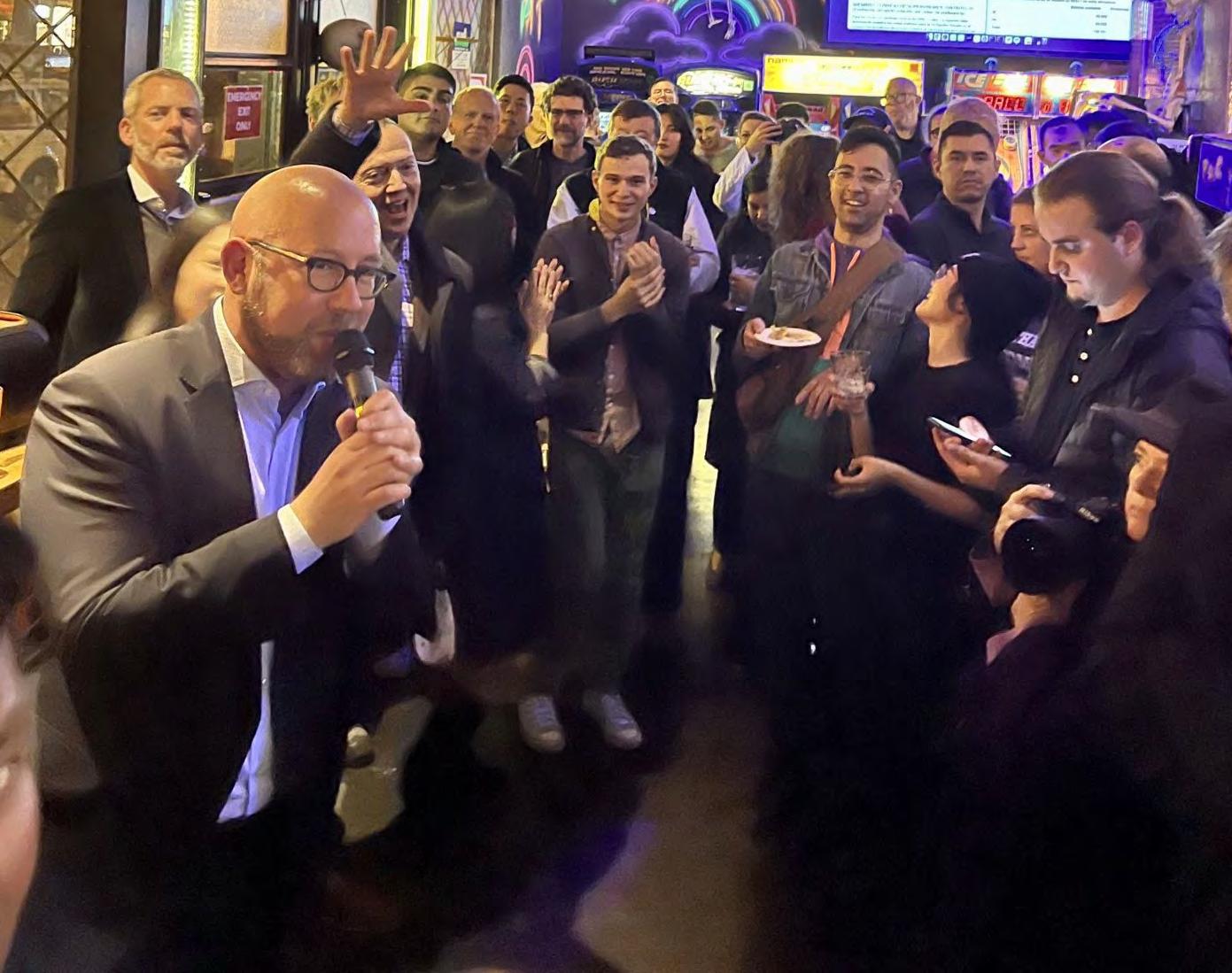
San Francisco District Attorney Brooke Jenkins, who was appointed to the post after the recall of former DA Chesa Boudin, declared victory Wednesday in the race to complete his term, while Public Defender Mano Raju easily won his reelection campaign.
Jenkins had a comfortable margin of 57.19% of the vote, according to unofficial returns from the San Francisco Department of Elections.
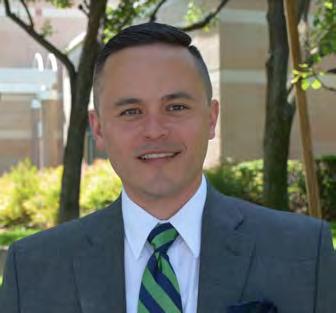
“I extend my thanks and gratitude to the voters of San Francisco for placing their trust in me to serve as district attorney,” she stated in an email to supporters.
“It is an honor of a lifetime to be elected and I pledge that improving and promoting public safety will be my and our office’s top priority,” Jenkins added.

The other candidates, attorneys John Hamasaki and Joe Alioto Veronese, both former police commissioners, were at 42.81% and 12.61%, respectively. A fourth candidate, Maurice Chenier, was at 4.58%, according to the preliminary figures.
“We can be a Democratic city ... we can be a liberal city, but stand for public safety,” Jenkins said at her victory party.
After the first round of ranked choice voting, based on the preliminary numbers, Alioto Veronese and Chenier would be eliminated.
Following the recall of Boudin in June, Mayor London Breed named Jenkins to take his place. Jenkins had been one of the leading spokespeople for the Safer SF Without Boudin recall campaign and had quit her job as an assistant district attorney in Boudin’s office to join the campaign against him.
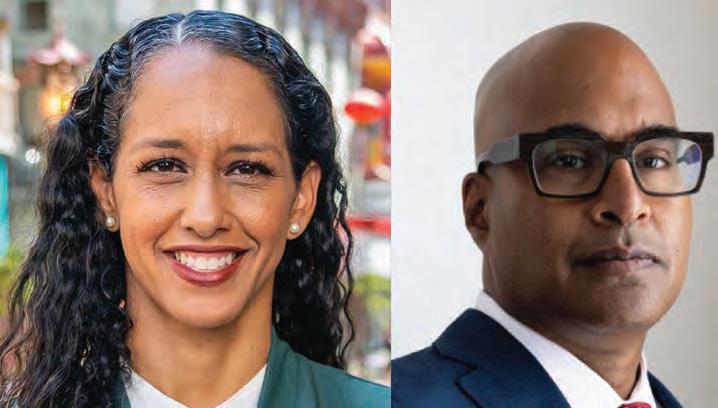
But her five-month tenure has been controversial. Criticism started when it
was revealed that she was paid more than $100,000 by a nonprofit linked to the recall campaign. During much of the last year, Jenkins, who resigned from the DA’s office last fall, became the public face of the recall campaign, for which she said she was a volunteer. In an editorial board meeting with the Bay Area Reporter, Jenkins said that she should have revealed the payments sooner.
There were also widely reported instances when she was an assistant district attorney in which she was accused of coaching a child witness and withheld discovery in two separate cases. Jenkins was adamant that she’s never been found to have committed misconduct. She said that the child witness incident resulted from someone from the public defender’s office secretly filming her outside of court talking to the 4-year-old witness, explaining the court process. (The
judge found no misconduct and the jury hung in that case.) With the discovery issue, Jenkins acknowledged that “a few items of evidence, nothing exculpatory” weren’t turned over to the defense, but she said it was not intentional and she was not found to have committed misconduct. (Prosecutors dismissed the case and restarted the prosecution, according to the San Francisco Standard.)
More recently, retired Los Angeles County Superior Court Judge Martha Goldin filed a complaint against Jenkins with the State Bar of California, alleging that Jenkins violated State Bar Rules and the Business and Professions Code through acts of dishonesty in connection with the payment by the nonprofit. In a campaign statement, Jenkins dismissed the complaint and pointed to her office’s work with the San Francisco Police
 by Lisa Keen
by Lisa Keen
Maura Healey, a popular Dem ocrat in a deeply blue state, coasted to victory Tuesday as predicted, becom ing the first lesbian to be elected gover nor of any state. Another lesbian can didate for governor, Another lesbian candidate for governor, Tina Kotek in Oregon, was declared the winner Wednesday.
Gay Colorado Governor Jared Polis sailed to a second term. But in a sur prise upset, five-term gay Congress member Sean Patrick Maloney (DNew York) appeared to be losing his seat in Congress, and a pro-Trump gay Republican appears to have defeated a gay Democrat for a U.S. House seat from New York.
Healey’s win in Massachusetts made her the first woman to win election as governor in that state and the first lesbian to win election as governor anywhere in the nation. (Bisexual Kate Brown was the first openly LGBTQ person to be elected governor when she won a special election bid in Or egon in 2016 but was termed out this year; Polis became the first gay man when he was elected governor of Colo rado in 2018.)
Healey, who helped lead the le gal battle for marriage equality and championed many challenges against Trump administration policies, tri umphed over a Trump-backed Re publican. That candidate, Geoff Diehl, had former President Donald Trump’s endorsement but not that of the state’s popular incumbent governor, Re publican Charlie Baker. Healey posi tioned herself to acknowledge Baker’s strengths.
In her acceptance speech, Healey delivered a message to “every little girl and young LGBTQ person out there.” She is her state’s first female governor.
“I hope tonight shows you that you can be whoever you want to be,” she said.
Healey also promised to be a gover nor for everyone, whether they voted for her or not.
The Associated Press called the race for Healey just five minutes after the polls closed at 8 p.m. Eastern time Tuesday. Early numbers indicated Healey won 63%, to Diehl’s 36%.
In Oregon, where voters have for de cades rejected Republican candidates for governor, Kotek, a Democrat and former speaker of the state House, had to contend with a third party candi date who appeared to be drawing nine points from voters who are believed would otherwise vote Democratic. As
of Wednesday morning, with 67% of the vote counted, Kotek held a onepoint lead over her Republican oppo nent. Kotek told supporters that she is “optimistic” but it was “still too early” to declare victory.
But by late Wednesday morning, she had declared victory. And in Colorado, Polis breezed to reelection, garnering about 62% of the vote at deadline.
LGBTQ candidates sought to dou ble the number of out members of the U.S. House this year. Going into Tues day’s election, that count was eight. At deadline, it appeared the number in the new Congress, which begins Janu ary 3, could be 11.
Eight of nine incumbent LGBTQ candidates in the U.S. House were run ning for reelection, and four had rela tively easy runs: Mark Pocan (D-Wis consin), Mark Takano (D-California), David Cicilline (D-Rhode Island), and first-termer Ritchie Torres (D-New York). One current openly gay mem ber of the House, Mondaire Jones, was redistricted into another district and lost the primary. At deadline, three of the four incumbents with tough races appeared to have won, but one is still awaiting final results in a race too close to call Wednesday morning.
At deadline, Maloney lost his hotly contested race for a sixth term in the U.S. House with 95% of the vote counted. He conceded Wednesday morning, Politico reported.

Because of redistricting, Maloney had to choose whether to run in Dis trict 18, his original district, or District 17, where his home is located under the new map. The complication: District 17 was the district being represented by
Jones. Much to Jones’ chagrin, Malo ney chose District 17 and soon found himself in a toss up race against State Assemblyman Mike Lawler.
Angie Craig’s 2nd Congressional District race in Minnesota is always a nail-biter, including this year, as the two-term lesbian Democrat faced the same Republican opponent she beat by only two points last time. The lead Tuesday night kept changing, but by Wednesday morning, with 99% of the vote in, Craig appeared to hang on to her seat for a second term, with a fivepoint margin. In the strangest of twists, just like during the 2020 race, a third party candidate’s name was also on the ballot even though that person is dead. In 2020, the dead candidate won 6% of the vote (voters are not alerted if a listed candidate is deceased); this year, the dead candidate won 3.3%.
Democrat Chris Pappas, New Hampshire’s first openly gay mem ber of Congress, appears to have won a third term in a congressional dis trict that has been split evenly among Democrats, Republicans, and nonaffiliated voters. After winning his first term by 8.6 points, he won the second term by 5.1 points. With 81% of the vote counted as of Wednesday morn ing, Pappas was 8.2 points ahead of a candidate promoted by Trump. That candidate, Karoline Leavitt, spoke out against trans women athletes and selfaccepted pronouns and said she would support Florida-like “Don’t Say Gay” legislation.
Lesbian Democrat Sharice Davids was holding a 13-point lead in her Kan sas district Wednesday morning, with 99% of the vote counted. Davids faced her 2020 challenger and a more Repub lican-leaning district this year, thanks to
redistricting. Pre-election polls suggest ed abortion might be a factor there, and Kansas voters in August overwhelming rejected an effort to give the state leg islature power to ban all abortions in the state. Davids supports the right of people to obtain an abortion; her Re publican opponent Amanda Adkins said she’s “pro-life” but thinks the issue should be decided at the state level, not federal government.
The LGBTQ Victory Fund support ed eight of the nine openly LGBTQ candidates for Congress this year. As of Wednesday morning, five of the nine appeared victorious.
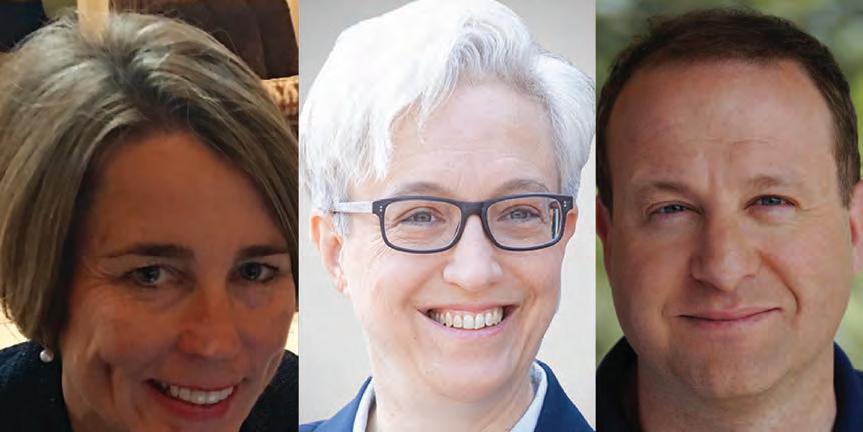
Becca Balint (Vermont-At-Large): Democrat Balint, president pro tem of the Vermont Senate, easily won her first bid for the state’s one U.S. House seat. According to the Associated Press, Balint, a lesbian former middle school teacher, beat the Republican Party’s candidate Liam Madden, a former Marine, by 35 points.
Eric Sorensen (Illinois): gay Demo crat Sorensen is running 3.4 points ahead of Republican Esther Joy King for this open seat from central-western Illinois. He was declared the winner Wednesday, becoming the first LGBTQ member of Congress from the Prairie State. During his victory speech, he said he would “make sure we all have a seat at the table.” He also thanked his “wonderful partner, Sean, for being a rock through all of this.”
Jasmine Beach-Ferrara (North Carolina): With 100% of the vote in Wednesday morning, Democrat Beach-Ferrara conceded as she was 10 points behind a Republican state senator for an open seat vacated by a
Democrat near the more progressive Asheville area. Beach-Ferrara, a lesbian county commissioner and ordained minister, was also an LGBTQ activist in the state.
Robert Garcia (California): Garcia, a gay Democrat and mayor of Long Beach, easily won this new congressio nal seat with 66% of the vote.
Will Rollins (California): In the heavily LGBTQ Palm Springs-Coach ella Valley area, gay Democrat Rollins had 56.5% of the vote over an anti-gay incumbent who has a zero score on LGBTQ votes in Congress, according to the Human Rights Campaign, the national LGBTQ rights organization.
Rollins is a former federal prosecutor who has worked on cases against some of the January 6 insurrectionists. The newly drawn district is 50-50 Demo crat-Republican.
In the other West Coast congressio nal race with an out candidate, lesbian former Santa Clara City Councilmem ber Jamie McLeod-Skinner is in a tight race for Oregon’s open, newly drawn 5th Congressional District. She is in second place with 47.6% of the vote, while her Republican opponent Lori Chavez-DeRemer has 52.4% of the current vote tally.
Heather Mizeur (Maryland): With 89 percent of the voted counted by Wednesday morning, Democrat Mizeur, a lesbian former state legisla tor, was running 23 points behind a pro-Trump incumbent she sought to unseat. Mizeur previously made a strong showing in a gubernatorial primary in Maryland. But District 1 is largely rural Eastern Shore territory and represented by the incumbent for 12 years now.
George Santos and Robert Zim merman (New York): The U.S. House race to represent Queens and Long Island, New York, was the first to ever pit two openly gay candidates against each other in a congressional general election. Wednesday morning, with 93% of the vote counted, pro-Trump Republican gay George Santos was 8.4 points ahead of Democrat Robert Zimmerman for the open seat, previ ously held by a Democrat. Santos had acknowledged attending the January 6 insurrection rally and said he would defend marriage equality but support a Florida-style “Don’t Say Gay” bill in Congress. Zimmerman is a former aide to members of Congress and po litical commentator who had the sup port of the Victory Fund.
The Gay & Lesbian Victory Fund said a record number of openly LGBT candidates ran for office during these mid-term general elections: 678. t



California voters have enshrined the right to abortion in the state’s constitution, according to preliminary returns November 8.
Proposition 1, the Constitutional Right to Reproductive Freedom, received 65.1% affirmative votes to 34.9% no votes, according to the secretary of state’s website, which reported 94.8% of precincts counted as of Wednesday morning.
The impetus for Prop 1 was the U.S. Supreme Court’s June decision that overturned Roe v. Wade, which had established the legal right to abortion nationwide for nearly 50 years. Governor Gavin Newsom quickly got behind Prop 1, which was spearheaded by lesbian state Senate President pro Tem Toni Atkins (D-San Diego).
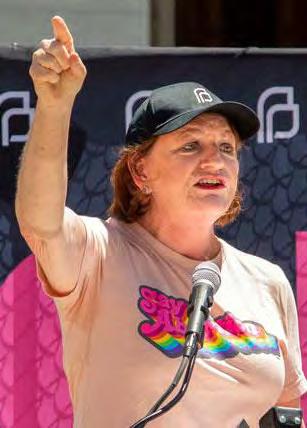
In a campaign letter to voters, Atkins wrote about why Prop 1 was important.
“As the author of Proposition 1, I have been reflecting in how personal this fight is to me,” she wrote. “Before being elected to office, I worked as a director of clinical services at a women’s health clinic and I saw firsthand what access — and lack thereof — meant for people.”
Atkins stated that with the fall of Roe, “we are all now at risk of having our freedom taken away.”
There is some question on if a federal ban on abortion is signed into law if that would render moot the new California state constitutional amendment. But legislative leaders pushed ahead with Prop 1 in earnest this summer after the high court’s Dobbs v. Jackson Women’s Health Organization decision. (There is also concern about whether other federal laws, like same-sex marriage, could also be overturned by the Supreme Court, but California LGBTQ advocates opted to work on a state constitutional amendment that would repeal the “zombie” Prop 8 same-sex marriage ban, likely in 2024.)
Prop 1 amends the state constitution to expressly include the right to privacy in personal reproductive decisions, including abortion. It furthers existing constitutional rights to privacy and equal protection and does not narrow or limit those rights, according to the official voter information guide.
Atkins was pleased with the election results.
“California sent a signal to the nation today, and the message is loud and clear: in our state, abortion is a right, and a conversation that will remain where it belongs – between a patient and their provider,” Atkins stated Tuesday night after the polls had closed. “I am thrilled that this constitutional amendment has been affirmed by voters, and that it will protect generations of Californians, and allow us to maintain control over our own bodies. While this is a positive step forward on the path, it’s certainly not the last, and my colleagues and I are committed to continuing our work on legislation and policy that will further protect reproductive rights and access in our state.”

There were six other statewide initiatives decided by voters in the November 8 election.
The dueling Indian gaming initiatives both went down to defeat after millions of dollars were spent on advertising by proponents and opponents on each side.
Proposition 26, which would have
allowed federally recognized Indian tribes to operate roulette, dice games, and sports wagering on-site on tribal lands, was defeated 70.1% to 29.9%. It was supported by most of the Indian tribes, including those that already operate casinos.
Proposition 27, which was bankrolled by out-of-state gambling corporations, lost 83.3% to 16.7%, early returns showed. That measure would have legalized online and mobile sports betting for people 21 and older. It would have allowed only federally recognized Indian tribes and eligible businesses that contract with them to operate the gaming sites.
A big winner Tuesday appeared to be Proposition 28, which provides additional funding for arts and music education in public schools. It was leading with 61.6% of the vote. It will establish minimum funding for such programs in all PK-12 public schools by annually allocating from the state general fund an amount equaling 1% of required state and local funding for public schools. There was no organized opposition to the measure.
For the third time in as many election cycles, a kidney dialysis measure went down to defeat, as Proposition 29 was losing 69.9% to 30.1%, unofficial returns showed.
Service Employees International Union United Healthcare Workers West has long sought the measure, which would have mandated a licensed medical professional be onsite at dialysis clinics. Opponents blanketed the airwaves with ads featuring dialysis patients opposed to Prop 29.



Proposition 30 was trailing in unofficial returns, 41% yes votes to 59% no votes. The initiative, a wealth tax to fund clean-air programs, would provide funding for wildfire prevention and zero-emission vehicle subsidies and infrastructure, such as charging stations. Prop 30 was strongly opposed by Newsom, who ran TV ads against it, even as the state said earlier this year that it would end the sale of gas cars within 12 years.
California voters support the state prohibiting the sale of most flavored tobacco products, as Proposition 31, a referendum on a 2020 law, passed 62.3% to 37.7% in early returns. The law signed by Newsom two years ago never went into effect because it was challenged by Big Tobacco. Supporters of the law said that tobacco companies try to entice young people to use their products by selling candy-flavored varieties in packaging designed to appeal to them. San Francisco voters in 2018 approved a similar local measure, upholding an ordinance passed by the Board of Supervisors.
Billions of dollars in federal match
ing funds for transportation and infrastructure projects in San Francis co likely will be available as Proposi tion L, a sales tax extension, was lead ing in early returns Tuesday night.
Prop L needed 66 and 2/3% to pass. Preliminary returns from the Depart ment of Elections showed it at 69.1% late Tuesday. The department, which has at least 104,000 ballots to count, will issue an updated vote tally at 4 p.m. Thursday.
Championed by gay District 8 Su pervisor Rafael Mandelman, who is also chair of the San Francisco Coun ty Transportation Authority, Prop L renews the one-half cent transporta tion sales tax that has been in place since 1989. In a guest opinion in the Bay Area Reporter last week, Mandel man stressed that it’s not a new tax.
The stakes could be high, Mandel man noted, as federal and state match ing grants for a number of projects could be redirected elsewhere if the tax isn’t renewed. San Francisco voters narrowly rejected a $400 million bond for Muni in June, further hamstring ing local transportation projects.
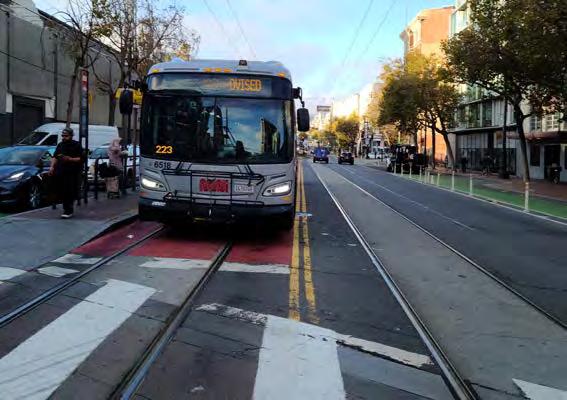
Money from Prop L will repair and repave roads, and reduce congestion for emergency vehicles so that they can re spond quickly and save lives. It will pay for the installation of crosswalks, traffic signals, and bulb-outs to protect pedes trians and construction of new protect ed bike lanes, Mandelman noted. It also dedicates new funding to the paratran sit system that has been overburdened during the COVID pandemic.
“I am even more excited Prop L appears to be passing,” Mandelman, who easily won a second term Tues day, told the Bay Area Reporter. “It’s critically important for a number of transportation investments we need to make in the next few years.”
It was a mixed bag in the other local ballot measure races.
Proposition A passed easily. It re stored a cost of living increase for some retired city employees who had it taken away in 2011. It was leading with 61.35% of the vote, according to unofficial returns.
City voters decided to revert San Francisco Public Works back to one entity, after voting two years ago to move the streets and sanitation divi sion into its own department. Propo sition B was leading with 73.82% of the vote. Under Prop B, separate over sight commissions for public works and streets and sanitation will re main. The streets commission will set street cleaning policy, while the public works commission will provide trans parency and critical guardrails against corruption, proponents noted.
Mayor London Breed opposed Proposition C, but voters decided they wanted an oversight body for the Department of Homelessness and Supportive Housing, which had
unanimous vote. Chan and Peskin maintain their measure would result in more affordable housing, but op ponents noted it contained poison pills that would prevent new con struction.
Unlike Prop L, Proposition F, the 25-year extension of a parcel tax to fund library services, needed only 50% plus 1 to pass. It was leading with 80.62% of the vote. Voters have twice approved similar measures. San Fran cisco property owners already pay two and a half cents per $100 assessed valuation, and that will continue to be collected and set aside for the library system.
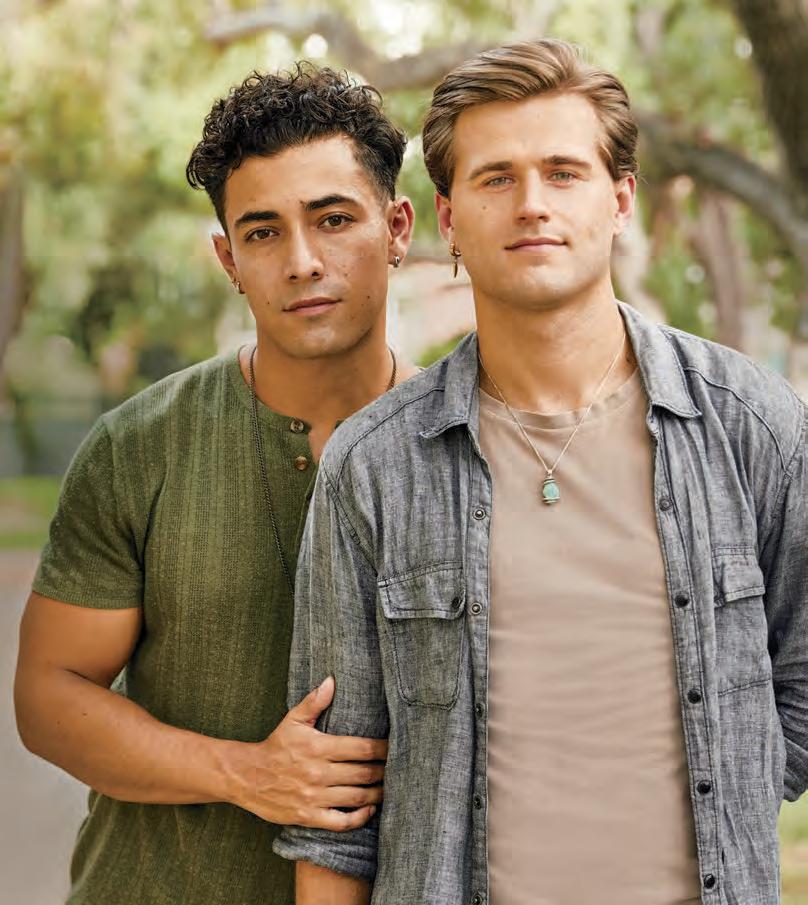
proved by the Board of Supervisors banning cars on 1.5 miles of the road, which has become a popular destina tion for walkers and bicyclists.
Prop J, dubbed Safe Parks for All, was ahead with 59.57% yes votes. It would reaffirm the aforementioned car-free Golden Gate Park Access and Safety Program passed by the Board of Supervisors in April.
Proposition M, which would have taxed owners who kept their homes vacant, was winning with 52.50% of the vote.
64.19% of the vote, according to un official returns. This measure will establish a commission that would hold public meetings, investigate de partment activities, and set clear goals for success, according to proponents. Commission appointments would be split between the mayor and the Board of Supervisors and include vet ting by the board’s rules committee, like other commission nominees.
Propositions D and E were the dueling affordable housing measures on the ballot. Voters were rejecting both, with Prop E receiving 55.77% no votes, and Prop D trailing with 50.04% no votes, unofficial returns showed. Breed was in favor of Prop D, which supporters maintain will make it easier and faster to build affordable low- and moderate-income housing. It removes bureaucratic roadblocks and requires prevailing wages and health care for workers.
Prop E, sponsored by Supervisors Connie Chan and Aaron Peskin, was placed on the ballot by the Board of Supervisors, though it was not a
Proposition G passed with 74.58% of the vote. It would provide up to $60 million a year from existing city funds to programs that improve academic success and social/emotional well ness for students. Dubbed the Student Success Fund, it does not raise taxes. It allows individual schools to apply for grants up to $1 million while requir ing participation from parents, teach ers, community members, and staff.
Voters want to combine the city’s off-year elections and approved Prop osition H to do that. The measure, supported by Supervisor Dean Pres ton, was leading with 69.61% of the vote in early returns. Under Prop H, the elections for mayor, sheriff, district attorney, city attorney, and treasurer would move to presidential election years, starting in 2024. Proponents argued it would greatly increase voter participation.
Propositions I and J were mixed, according to early returns. Prop I, which was losing with 60.86% no votes, would bring back vehicles to a portion of JFK Drive in Golden Gate Park and undo a compromise reached by Supervisor Gordon Mar and Breed closing the Great Highway to vehicles on weekends. Breed sponsored the JFK Drive legislation that was ap
Proposition N was passing with 72.68% of the vote. Breed is the main proponent of the measure that im proves accessibility to Golden Gate Park for people who depend on driv ing by giving the city more flexibility over parking rates and management of the Golden Gate Park Music Con course parking garage. Under Prop N, the city could subsidize parking rates for visitors with disabilities and those who are low-income. It would also transfer jurisdiction from the concourse authority to the Recreation and Parks Department, ultimately re pealing Prop J that was passed by vot ers in 1998.
Proposition O, an additional parcel tax for City College of San Francisco, was trailing, according to early returns, with 34.35% in favor and 65.62% op posed. This only needed 50% plus one to pass, and would have created a temporary 20-year tiered parcel tax, with higher rates for commercial properties; homeowners would pay $150 a year or $75 per unit for two or more residential units, according to the voter guide. The money would have been used for student programs such as basic-skills needs, workforce development, and academic success, according to the voter guide. t
Michael M. Yamashita
Thomas E. Horn,
Last week, Governor Gavin Newsom and first partner Jennifer Siebel Newsom announced the latest list of honorees for the California Hall of Fame and, once again, a deserving LGBTQ person was omitted. While all of the members of this year’s class, including lesbian soccer star Megan Rapinoe, are commendable, the fact that the LGBTQ community has been waiting seven years to see the late gay Latino veteran and drag queen José Julio Sarria added posthumously to the hall is frustrating.
It was back in 2015 that we urged then-gov ernor Jerry Brown and his wife, Ann Gust, to induct Sarria, to no avail. (The California Hall of Fame is a project of the governor, first part ner, and the California Museum.) Since then, the Legislative LGBTQ Caucus has worked on the matter but has also come up short in its entreat ies to the governor.
Other LGBTQ elected officials and communi ty leaders have also sought to see Sarria named to the hall, only to be let down every year when the new list of honorees is released. And yes, in recent years, there usually has been at least one LGBTQ person inducted, but since the hall of fame hon ors residents of the state who have made lasting contributions to society, it’s hard for us to see how Sarria misses the cut year after year.
Newsom, a former mayor of San Francisco who has always enjoyed broad support in the LGBTQ community, surely knows about Sarria and his contributions.
For those who don’t know, Sarria, who died in 2013 at the age of 90, made history in 1961 as the first out gay person to seek elective office in the U.S.
His bid for a seat on the San Fran cisco Board of Supervisors was un successful but his public declaration to fight for gay rights paved the way for many LGBTQ candidates who fol lowed to seek and win elective office, not only in the Golden State but across the country. That was evident this week as LGBTQs, for the first time in history, ran for public office in all 50 states.
Out candidates won elective office in numer ous states – as well as right here in the Bay Area –with some making history as the first out person elected to their office.
Then there is Sarria’s charitable work. He was
a pioneer in San Francisco’s nascent but growing gay community in the 1950s. He created what became known as the Imperial Court System and crowned himself “Her Royal Majesty, Em press of San Francisco, Jose I, The Widow Nor ton.” The title was in homage to Joshua Norton, an eccentric city resident who in 1859 declared himself Emperor of the United States and Pro tector of Mexico. But more than just a social club for drag queens, the Impe rial Court has raised millions of dol lars for charity and helped educate the public about drag culture and LG BTQ rights. The San Francisco Imperial Council celebrated its 57th anniversary this year and was the first of numer ous Imperial courts around the country and the world.
San Diego resident Nicole Mur ray Ramirez, a former Imperial Court empress who currently holds the title Queen Mother I of the Americas, Canada, United States, and Mexico, is one of the leaders of the cam paign to see Sarria inducted into the hall of fame. Reached for comment last week on this year’s absence of Sarria in the new class, Ramirez said, “We’re disappointed, but we’re going to keep writing letters.” Ramirez pointed out that Sarria
was a Latino servicemember and a historic figure in the LGBTQ community.
In fact, that diversity is important. Again, like their straight counterparts, the LGBTQ people selected for the hall over the years have all been deserving, but most of them have been cis white people. We have yet to see a trans, bisexual, queer, or nonbinary person honored. LGBTQ people of color who have been inducted include gay actor George Takei and gay television personality and reality show host RuPaul Charles.
Next month, the city of Palm Springs will be honoring Sarria with induction into its Walk of Stars as part of the 100th jubilee taking place to honor him. (The events are being organized by the José Sarria Foundation, which considers De cember 12, 1922 to be Sarria’s birthdate. Other records show his birthdate as December 12, 1923.)
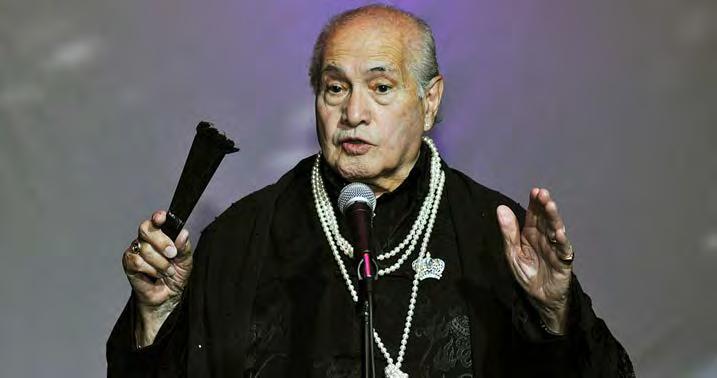
Someone like Sarria, who has contributed so much to the LGBTQ community – and was a history-maker in his own right – surely belongs in the California Hall of Fame. Since he easily won reelection to a second four-year term Tues day night, Newsom will have another opportu nity next year when the 2023 class is announced. He and Siebel Newsom should include Sarria in the hall of fame. t
Ournation’s political landscape is frighten ing, to say the least. Every day, I read new headlines about political extremists who are at tacking the rights of LGBTQ+ people in school, at work, and in the doctor’s office. In fact, just a few days ago, Florida’s Board of Medicine took the unprecedented step of banning (https:// www.medscape.com/viewarticle/983664) doc tors from providing gender-affirming care. This ban has grave repercussions for the health of Florida’s transgender youth and threatens all of us by inviting politicians to make unscientific decisions about patients’ access to medical care.



As a health care researcher and advocate, I am appalled at the continued disregard for scientific evidence that supports gender-affirming care. Every major medical association in the United States endorses gender-affirming care for trans gender people. This includes the American Med ical Association, (https://www.ama-assn.org/ press-center/press-releases/ama-reinforces-op position-restrictions-transgender-medical-care ) American Academy of Pediatrics, Federation of Pediatric Organizations, and the American Psy chological Association. These expert endorse ments reflect a consensus that age-appropriate and individualized gender-affirming care is medically necessary and life-saving.
Contrary to what anti-trans extremists want you to believe, decades of evidence demonstrate that gender-affirming care is safe and effective.
The only intervention for children before puber ty is social transition, which is endorsed by the American Academy of Pediatrics and involves nothing more than allowing children to wear the clothing they feel most comfortable in or to go by a name that they choose. Transgender youth can begin medical affirmation once they hit puberty, which is when they may experience increased gender dysphoria as their bodies rapidly change.
At this point, transgender adolescents can talk to

their doctors about starting puberty-delay medications. These fully reversible treatments give them time to freely explore their gender identity. Later in adolescence, transgen der youth may receive hormone therapy, which allows them to go through a puberty that aligns with their gender. Puberty-delay medications have been safely used for decades and were origi nally developed to treat cisgender young people who were starting puberty at the wrong time.
Despite the decades of evidence demonstrating the safety and effectiveness of gender-affirming care, political extremists continue to exploit misin formation about transgender people. Florida’s ban itself is not based on research – rather, it’s fueled solely by misinformation and political punditry. I took a look at the contributing authors in the re port (https://ahca.myflorida.com/LetKidsBeKids/ index.shtml) that led to this ban, and I was disap pointed but unsurprised to learn that they are not actually experts in transgender health or even gen
eral pediatric care. One of them is a dentist, and the other is a postdoctoral fellow in biostatistics. These are hardly the people I want to weigh in on decisions about gender-affirming care.
Anti-trans extremists are succeeding in stok ing fear and division in our communities. They seek to score political points by manipulating so ciety’s understanding of what gender-affirming care is and who transgender youth are. But trans gender youth are not pawns in a political game. They are young people who want to experience love, joy, and the ability to be their authentic selves. We know that making gender-affirming care accessible improves the mental health and quality of life for transgender youth. Our young people thrive when they are supported by their families, pediatricians, and mental health provid ers to feel at home in who they are.
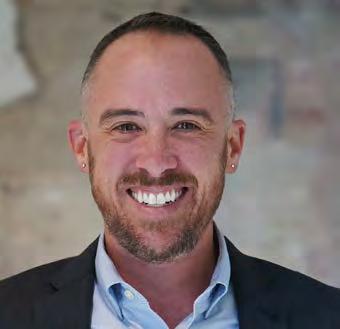
Florida’s ban isn’t just an attack on trans people. It’s a dangerous harbinger of what’s to come across our nation when we let political ideology drive health care decisions. When it comes to medical care, let’s listen to the pro fessionals who know the science, follow the standards, and are com mitted to the well-being of their patients. All of us need to speak up and let our elected leaders know we won’t let politics get in the way of the health care we need. t
Kellan E. Baker, Ph.D., a queer-identified man, is the executive director and chief learning officer of the Whitman-Walker Insti tute in Washington, D.C., one of the country’s premiere organizations focused on advanc ing the health and wellbeing of people facing barriers to quality care, particularly LGBTQ people and people living with HIV, through the strategic integration of clinical exper tise, cutting-edge research, quality educa tion, and effective policy change.
Gavin Newsom and Insurance Com missioner Ricardo Lara, a gay man who is the sole LGBTQ statewide elected official in the Golden State, both glided into second terms in Tuesday’s election. Neither faced much of a reelection fight after Newsom defeated last year’s recall attempt against him and Lara van quished a fellow Democratic rival in the June primary.
Newsom trumped his Republi can opponent, state Senator Brian Dahle (R-Bieber), with 57.7% of the vote, according to the unoffi cial returns that included 94.8% or precincts partially reporting. So as sured of his winning their contest, Newsom largely avoided campaign ing on his own behalf and instead used his advertising to promote or oppose several of this year’s state wide ballot measures.
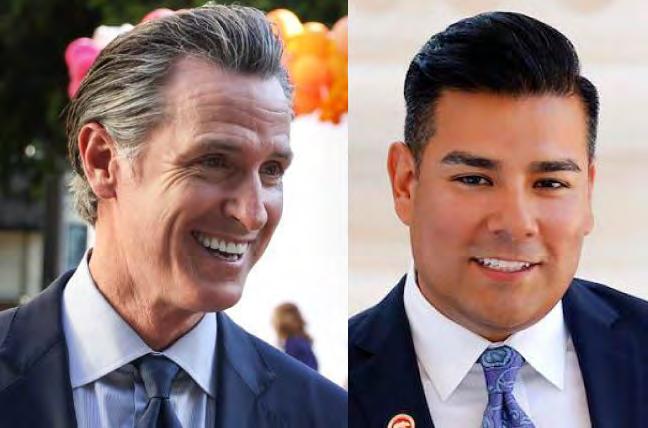
Lara also was largely a non-pres ence on the campaign trail in recent weeks, having been opposed by his little-known challenger, Republican Robert Howell. Based on the cur rent vote tally, Lara took first place with 58% of the vote.
As there were no other out candidates that made it to the fall ballot, Lara remains the lone LGBTQ statewide leader in California. His election four years ago marked the first time an LGBTQ per son had been elected to such a position.
It is a particularly sweet vic tory for Lara, who overcame ethi cal scandals dating back to 2019 to secure a second term. Lara’s travails led the San Francisco Chronicle to refuse to endorse his reelection bid and had prompted Assemblymem ber Marc Levine (D-Greenbrae) to try to oust him from office. But when the Bay Area legislator failed to survive the June primary, the race effectively was over.
The most competitive contest on Tuesday’s ballot was between
From page 3
Department in arresting an alleged drug dealer who was preparing to sell seven pounds of fentanyl.
Despite the political attacks, Jenkins had amassed considerable support with elected officials and community groups eager to see a change in the DA’s office from the progressive Boudin, particularly in addressing property crimes and open-air drug dealing. Jenkins had broad support in the LGBTQ Castro neighborhood in which she met with local merchants and did a walking tour with gay District 8 Supervisor Rafael Mandelman, who endorsed her. During a virtual meeting of the Castro Merchants Association, Jenkins was warmly received, as the
Republican Stanford University professor Lanhee Chen and Demo cratic state tax board member Malia Cohen to succeed Controller Betty Yee, who is termed out of office. Co hen declared victory Tuesday night with 53.7% of the vote while Chen was at 46.3%.
Chen was the strongest GOP candidate to mount a run for state wide office in years. Cohen tagged him as a “Trump Republi can” who would block women’s access to abor tion and reproductive health services. LGBTQ advocates questioned his embrace of reli gious liberty propo nents, who use it as a legal argument to avoid anti-LGBTQ discrimina tion laws, as the Bay Area Reporter noted last month.
In the rest of the statewide races, the Democrats all appear headed to easy victories, preliminary re turns show. None of the candidates mounted serious election efforts against their Republican opponents.
Democratic Lieutenant Governor Eleni Kounalakis took first place with 57.8% of the vote in her con test against Republican Angela E.
B.A.R. previously reported.
Jenkins did retain Boudin’s external Innocence Commission and, in late September, named Julia Cervantes to serve as the DA office’s representative on the panel. Cervantes leads the office’s postconviction review unit and has prior experience in the DA’s office, where she worked for many years.
Public defender’s race
Raju, who has been the public defender since Breed appointed him following the death of Jeff Adachi in 2019, easily won reelection with 70.04% of the vote, according to preliminary returns.
After running unopposed three years ago to complete Adachi’s term, Raju this year faced challenger Rebecca Young, who is a former deputy public defender

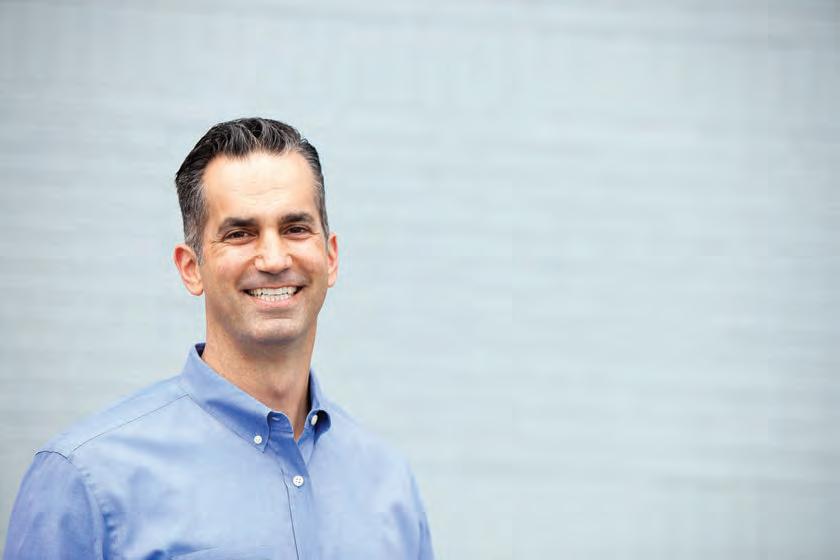
Attorney General Rob Bonta, whom Newsom had appointed to the position, was in first place with 57.3% of the vote against GOPer Nathan Hochman
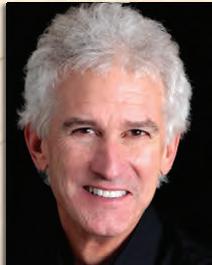
California Treasurer Fiona Ma, a former San Francisco supervisor, was leading with 57.2% of the vote against her GOP challenger Jack M. Guerrero
Democratic state Superintendent of Public Instruction Tony K. Thur mond is sailing to a second term with 62.8% of the vote in his race against GOPer Lance Christensen
Democratic former state legislator Shirley Weber, appointed by New som as secretary of state, also was the first-place finisher in her contest Tuesday with 58.1% of the vote. She defeated GOPer Rob Bernosky
After being appointed as the state’s junior U.S. senator, Demo crat Alex Padilla easily won his special election on the primary bal lot to serve out the rest of the term through the end of 2022. He did so again on Tuesday’s ballot with 58.9% of the vote.
He also secured a full six-year term with 59% of the vote. In both races, he ran against GOPer Mark P. Meuser, a lawyer who lost to Padilla in their 2014 race to be California’s secretary of state.t
and private defense attorney. On her campaign website, she stated that the office has lost sight of its “core mission at the expense of quality representation of its clients in the Criminal Justice system.” She also claimed staff morale was low.
Raju disputed those characterizations. With 240 people in the public defender’s office, Raju told the B.A.R. that he has invested in training and in promoting candidates to management positions. “I’ve never seen morale so good,” he said during an editorial board meeting.
Meanwhile, in the hotly contested race for the District 6 supervisor seat centered in South of Market, trans gender San Francisco Democratic Party Chair Honey Mahogany is trail ing gay District 6 Supervisor Matt Dorsey. He is the second person liv ing with HIV to fill a vacancy on the Board of Supervisors.
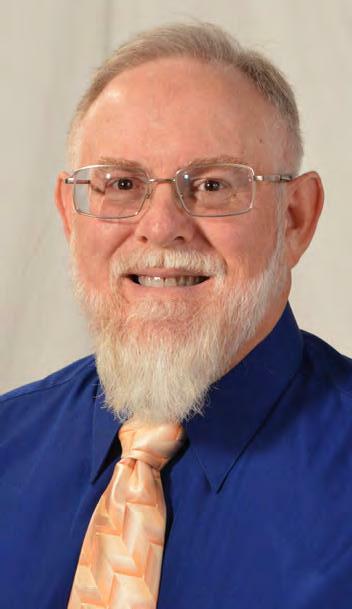
And in the race for the District 4 seat in the city’s Sunset District,

Supervisor Gordon Mar was trail ing a challenge from gay former journalist Joel Engardio. He is in second place with 48.52% of the vote, while Engardio is in first place with 51.48%.
“We are on the right side so far,” Engardio said. “But it is still too close to call.”
It was Engardio’s fourth super visor candidacy. He lost three past bids for the District 7 supervisor seat, which he was redistricted out of this year.
The public defender’s office represents those criminal defendants who cannot afford legal representation. t
The benefits are immense.
The benefits are immense.
When you plan your life celebration and lasting remembrance in advance, you can design every detail of your own unique memorial and provide your loved ones with true peace of mind. Planning ahead protects your loved ones from unnecessary stress and financial burden, allowing them to focus on what will matter most at that time—you.
The benefits are immense.
When you plan your life celebration and lasting remembrance in advance, you can design every detail of your own unique memorial and provide your loved ones with true peace of mind. Planning ahead protects your loved ones from unnecessary stress and financial burden, allowing them to focus on what will matter most at that time—you.
Mahogany, vying to become the first transgender person and first drag queen elected to public office in San Francisco, as well as the city’s first out Black supervi sor, stands at 41.11% of the vote. Dorsey, a recovering addict, has 58.89% of the vote.
Addressing her election night party attendees at 10:50 p.m., Ma hogany said it was frustrating that “so few votes have been counted”
When you plan your life celebration and lasting remembrance in advance, you can design every detail of your own unique memorial and provide your loved ones with true peace of mind. Planning ahead protects your loved ones from unnecessary stress and financial burden, allowing them to focus on what will matter most at that time—you.
Contact us today about the beautiful ways to create a lasting legacy at the San Francisco Columbarium.
Contact us today about the beautiful ways to create a lasting legacy at the San Francisco Columbarium.
Contact us today about the beautiful ways to create a lasting legacy at the San Francisco Columbarium.
One Loraine Ct. | San Francisco | 415-771-0717
Proudly serving our Community.


SanFranciscoColumbarium.com
Proudly serving the LGBT Community.
Proudly serving the LGBT Community. FD 1306
Gay Santa Clara City Council member Anthony Becker is locked in a tough race to be elected mayor of the South Bay city. Should he prevail, Becker would be the first LGBTQ person elected mayor of a large Bay Area city.
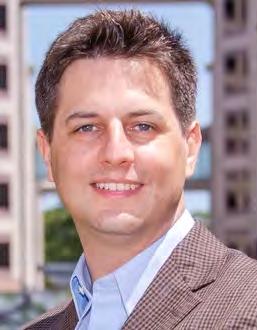
Becker, endorsed by the San Jose Mercury News, is trying to oust from office Mayor Lisa Gillmor. Ac cording to the unofficial results, he was in second place with 49.82% of the vote compared to Gillmor’s 50.18%. Her lead was at just 53 votes as of midnight.
“This is an incredible race to be this close, separated by 53 votes. We have hope and faith in this race and it’s not over yet,” Becker tweeted Wednesday.
Their contest largely centered on the ramifications of the city luring the San Francisco 49ers to Santa Clara a decade ago. Becker lambasted Gill mor’s support of the stadium deal and her antagonistic relationship with the football team ever since.
She painted Becker as in the pocket of owner Jed York due to the millions of dollars the team spent in support of Becker’s candidacy and that of his al lies on the council. It is an accusation
decried as inaccurate by Becker, who argued new leadership at City Hall is needed that can negotiate with the 49ers for terms on the stadium more beneficial to Santa Clara taxpayers. Next door in San Jose in a race that pitted two straight allies against each other, City Councilmember Matt Ma han has the edge in his bid to become mayor of the Bay Area’s largest city. He was leading with 51.76% of the vote against Santa Clara County Supervisor Cindy Chavez, who trails with 48.24%.
“We finished last night with a narrow lead and we are cautiously optimistic,” tweeted Mahan, who had the backing of termed out May or Sam Liccardo and the San Jose Mercury News..
Meanwhile, Chavez remained hopeful she could still eke out a win. A former San Jose councilmember, she had support from many LGBTQ leaders.
“At this hour, votes are still being counted. And we’re still waiting anx
iously to see who will become San Jose’s next mayor,” wrote Chavez in an email Wednesday to supporters.
Meanwhile, a number of out council candidates on the Penin sula and in the South Bay appear headed to victory. In the most highprofile race gay Democratic Party official Omar Torres is set to return out leadership to the San Jose City Council for the first time in 16 years.
The San Jose native was in first place for the District 3 council seat with 63% of the vote. Torres will be the first out person of color on the council and only its second out LG BTQ member.
In Cupertino J.R. Fruen, a gay man, mounted his second council bid after losing his race two years ago. He was one of seven candi dates running against an incumbent councilmember for three citywide council seats on Tuesday’s ballot.
Fruen is currently in second place with 17.10% of the vote. If elected, the attorney would be the first LG BTQ person to serve on the Cuper tino City Council.
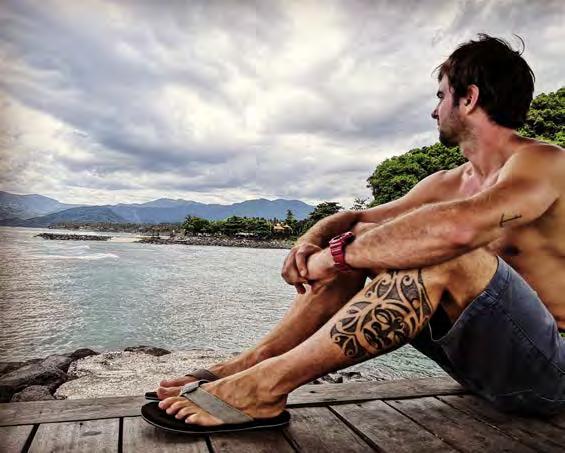
Richard Mehlinger, who is queer and bisexual, is hoping to serve along
Toy drives to help children this holiday season have started or will soon begin in San Francisco.
Cliff’s Variety in the Castro will start its holiday toy drive Thanksgiv ing week, manager Terry Asten Ben nett wrote in a Facebook message.
People can drop off new, un wrapped toys for kids of all ages beginning Monday, November 21 at the store, located at 479 Castro Street. The toys will be distributed by the San Francisco Police Depart ment’s Mission Station, she added. People can drop off toys through Friday, December 16.
Meanwhile, the SFPD is once again teaming up with Walgreens to also collect toys for children in need. A news release noted that this

is the seventh year the department has worked with the store, which has various locations throughout the city.

“SFPD will be accepting dona tions of new, unwrapped toys at over 40 San Francisco Walgreens locations,” a release stated. The ef fort started last week and also ends December 16.

Last year, approximately 5,000 toys were donated at Walgreens stores, the release stated.
ALRP’s Hirsh to receive Brinker award
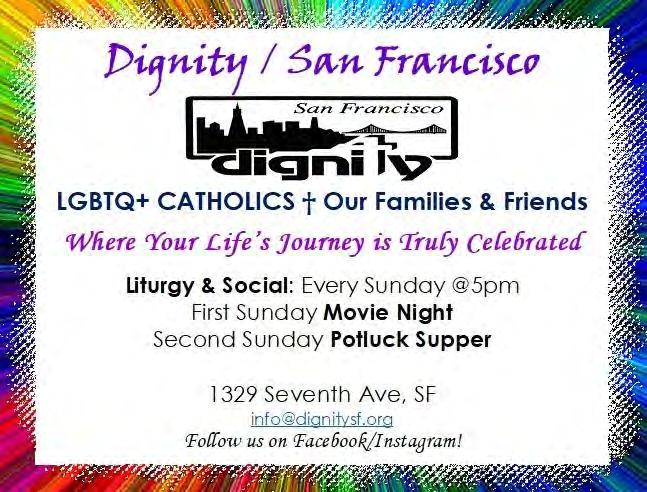
Bill Hirsh, a gay man and the longtime executive director of the AIDS Legal Referral Panel, will re ceive the Ruth Brinker Visionary Award from Project Open Hand at its 30th annual Hand to Hand cel
ebration Friday, December 9, from 7 to 10 p.m. at the historic Hiber nia Building, 1 Jones Street in San Francisco.
Brinker, a straight ally, founded Project Open Hand in 1985. The retired food service worker and grandmother saw people needing nutritious means in the early days of the AIDS epidemic.
“Ruth’s vision of meals with love is still alive and is the motivating force behind everything we do at Project Open Hand,” the agency noted on its website. “We continue to serve people with HIV/AIDS, and have expanded to feed seniors and people fighting cancer, heart disease, diabetes and many other se rious illnesses.”
Brinker died in 2011 at the age of 89.
Project Open Hand now serves on a daily basis 2,500 meals, the agency stated.
ALRP was founded in 1983 by attorneys Frederick Hertz, Steven Richter, Mark Senick, and Gary James Wood, the agency’s website
stated. It was originally a commit tee of the LGBTQ organization Bay Area Lawyers for Individual Free dom, or BALIF. ALRP recruited lawyers to help gay men and others affected by HIV/AIDS so that they could prepare wills and power of at torney documents.
It grew from a group of concerned attorneys to an established lawyers referral service and expanded to serve people of color, women, children, injection drug users, non-native English speakers, and the homeless, the agency’s website noted.
Hirsh became the agency’s fourth executive director in 2000 and, to day, the agency serves clients in seven Bay Area counties.
“Just as ALRP be gan with a group of volunteer at torneys responding to the AIDS crisis, Ruth Brinker mobilized an army of volunteers to provide healthy meals to sustain people
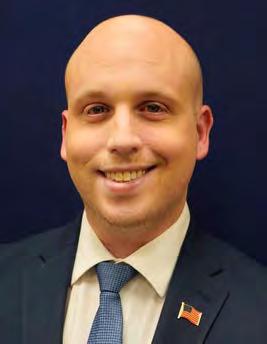
side queer Sunnyvale City Council member Alysa Cisneros, elected in 2020. He was one of two candidates seeking the District 5 council seat and currently is in first place with 70.68% of the vote.
Several others were trailing in sec ond place by just a handful of votes.
Sarah Fields, a queer and bisexual San Mateo resident, sought Tuesday to become her city’s first out LGBTQ councilmember. Running for the Dis trict 3 council seat against two male opponents, Fields stands at second place with 40.83% of the vote. She is short of first place by 129 votes.
Gay Redwood City planning com missioner Chris Sturken also sought a council seat in his city. He was one of three candidates running for the Dis trict 1 seat, which includes the down town area.
Sturken was in second place with 37.83% of the vote. He is shy of first place by 46 votes.
If he wins then the 28-year-old would be the youngest man on his city council in recent memory and its third out member. Two years ago saw the elections of Michael Smith, a gay Black business entrepreneur, and Lissette Espinoza-Garnica, who is a queer, nonbinary Chicanx. t
who were often too weak to cook for themselves or even leave their home to get food,” Hirsh stated in the announcement of the award.
“I am deeply honored and hum bled to receive Ruth’s namesake award,” he added.
In addition to the recognition for Hirsh, other awards will be given out at the event. The Most Outstanding Community Partner Award for an organization will go to the Rich mond-Ermet Aid Foundation and for an individual to Bau Ky. Google will receive the Most Outstanding Corpo rate Supporter Award, and Kaiser Perman ente will be honored with the Community Advocate Award.
Hand to Hand will feature local fare inspired by Bay Area chefs, entertainment, and unique live auction items.
Tickets are $125 and can be pur chased at https://e.givesmart.com/ events/mSS/. t



It was a mixed bag for incumbents in races for the San Francisco Board of Education and the City College of San Francisco Board of Trustees.
In the school board race, appoint ed incumbents Lainie Motamedi and Lisa Weissman-Ward easily won election. The other appointee, Ann Hsu, was also leading, despite her controversial racist remarks on a candidate questionnaire this summer. According to unofficial re turns, Weissman-Ward had 22.97%, Motamedi garnered 20.28%, and Hsu was at 18.65%.
Mayor London Breed appointed all three women in March after vot ers ousted board president Gabriela López and Commissioners Faauuga Moliga and Alison Collins in the February recall. (López was also a candidate Tuesday night but lost, garnering 12.1% of the vote, ac cording to preliminary returns.)
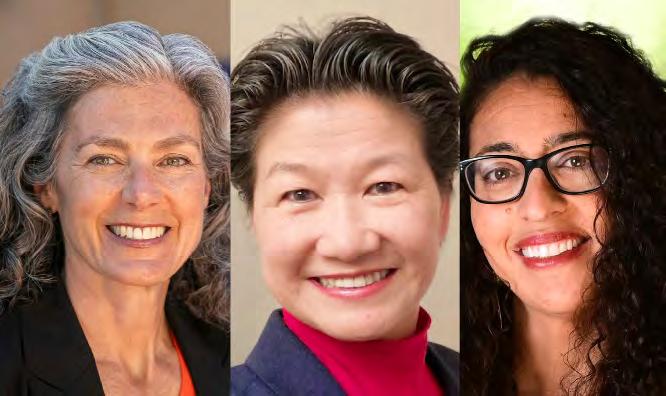
Prior to being appointed to the school board, Motamedi, a San Francisco Unified School District parent, completed a four-year term serving as co-chair of the Public Education Enrichment Fund Com mittee where she advocated for ac countability and transparency re form to ensure that San Francisco city funds were utilized for student life as mandated by the city charter.
Weissman-Ward is an attorney who is the associate director of Stanford Law School’s Immigrants’ Rights Clinic, where she both rep resents individuals facing deporta tion and those seeking asylum (and other matters), and teaches and mentors law students. As a parent of two students in the district, she wrote in her Bay Area Reporter can
didate questionnaire that she un derstands “how badly the trust was broken between the school board and the public.” She stated that she is focused on student-centered out comes to rebuild that trust.
Hsu, who was born in China, lives in the Richmond district. She served as president of the Galileo High School PTSA and chair of the district’s In dependent Citizens’ Bond Oversight Committee, according to a news re lease from the mayor’s office after she was appointed. She has a bachelor’s degree in electrical engineering from Penn State University and a master’s degree in electrical engineering and MBA from UC Berkeley.
There were no out LGBTQ can didates in the school board race this year. Current Trustee Mark Sanchez,
a queer man who was not up for re election, is the sole LGBTQ member of the school board.
In the City College election, all the incumbents were headed to defeat except new Trustee Murrell Green, a straight man and educator whom Breed had appointed in May to replace gay former trustee Tom Temprano, who resigned in Febru ary to become political director for Equality California, the statewide LGBTQ rights group. (Temprano also resigned from his job as a legis lative aide to gay District 8 Supervi sor Rafael Mandelman.)
Green received 59.34% of the vote for the two-year seat finishing Temprano’s term.
He is likely to be joined by new comers Anita Martinez, who re ceived 13.62%; Vick Chung, who is nonbinary and received 12.94%; and Susan Solomon, who received 12.91%, according to unofficial re turns.
Incumbents John Rizzo, Brigitte Davila, and Thea Selby were in fourth, fifth, and sixth place, respec tively. A parcel tax that would have funded workforce development programs and other student servic es at the college was also losing as of Wednesday morning.
“San Francisco voters have spo ken about City College in the Prop O and trustee elections: They do not approve of the performance of City College and are looking for a change in direction,” stated Trustee
Alan Wong. “They want leadership that provides good governance and accountability to the public. I pledge to work together with new trustees to provide the leadership the public expects for City College.”
The incumbents all had to make the tough calls as City College was hit hard by the COVID pandemic and enrollment stalled. Earlier this year the board approved layoffs of 30 full-time faculty in an effort to stabilize City College’s finances. There’s also a new chancellor, David Martin, who took over last year.
Martinez, who ran for the college board in 2020, stated on her website that she was running this year be cause the “incumbents have allowed hundreds of classes to be recklessly cut and have laid off over 40 classi fied employees, 38 tenure and ten ure track faculty, and 100s of parttime faculty.”
In the voter guide, Chung, a re cent student trustee, stated they were running because of the bud get problems facing the college. “I worked with student leaders and labor unions across the state to fight corporate interests and protect ac cess to public education,” Chung stated. They are a sexual health edu cator and social justice advocate.
Solomon, a retired teacher, stated that she was running to support students. “City College must serve everyone,” she wrote in the voter guide.
Candidate William Walker, a gay man and former student trustee, came up short, receiving 6.04% of the vote. The college board has another out member, bi woman Shanell Williams, who was not up for reelection this year. t
Two Oakland city councilmembers were leading in the ranked choice balloting for mayor, while the District 4 council race assures there will be queer representation on that body.
Sheng Thao and Loren Taylor were early leaders among the 10 candidates vying for Oakland mayor. The count ing of ranked choice ballots will resume Wednesday, and the eventual winner likely will not be known for a few days.
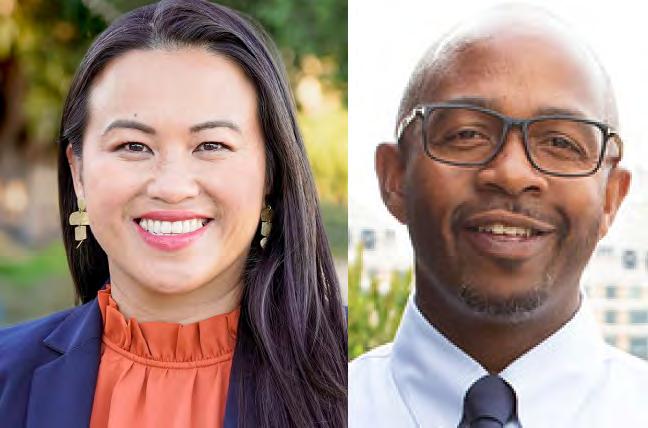
Thao, who currently represents District 4, had 28.73% of the early vote. Taylor, who currently represents District 6, had 34.19%, unofficial returns showed. Former longtime councilmember Ignacio De La Fuente rounded out the top three contenders with 12.89% of the vote.
In fourth was Allyssa Victory Vil lanueva with 6.93%, while District 7 City Councilmember Treva Reid rounded out the top five with 5.93%.
In the race’s closing weeks, Taylor and Reid announced a one-two strat
egy, urging their supporters to vote for the other candidate as their second choice vote.
“I am encouraged that, from what has been counted thus far, I have earned the most first place votes of any candidate,” stated Taylor. “I be lieve we are on a path to victory, but it is too soon to say much more than that tonight. Here in Oakland, we be lieve in free and fair elections where every legal vote is counted and the will of the voters is respected.”
In the race for the District 4 council seat, which Thao is vacating because she’s running for mayor, queer social justice attorney Janani Ramachan dran easily defeated queer sex store owner Nenna Joiner, 64.26% to 35.74%. The district includes much of the Oakland hills and the neighbor hoods of Dimond, Glen Highlands, Montclair, Glenview, Laurel, and Red wood Heights, among others.
Since Ramachandran’s unsuccess ful run for Assembly last year after Governor Gavin Newsom tapped
Rob Bonta to be state attorney general (his wife, Mia, won the race to suc ceed him in the Assembly and easily secured reelection Tuesday), she has pivoted to local office. She has served on the Oakland Public Ethics Com mission.
Among the four candidates run ning for the District 6 seat on the Oakland City Council is tax preparer Nancy Sidebotham, a lesbian mak ing her seventh bid to be elected to a council seat. It is also open this year, as Taylor opted to run for mayor rather than seek reelection. Sidebotham again fell short, landing in second place with 13.31% of the vote.
In countywide races on East Bay ballots, Marguerite Young, a lesbian single mom, won reelection to a third term on the East Bay Municipal Util ity District’s oversight body’s Ward 3 seat. She received 82.28% of the vote, while water utility planner Mark Seedall, who is straight, came in sec ond with 17.72%.
Bisexual EBMUD Director AndyKatz, who also identifies as gay, was unopposed for the third election cycle in a row and will be automatically ap pointed to another four-year term in his Ward 4 seat. Both Katz and Young represent districts that span Contra Costa and Alameda counties.
Nonbinary queer architect and art ist Alfred Twu fell short in their bid to oust AC Transit Board Vice President Joel Young from his at-large seat on the board that oversees public trans portation services in Alameda and Contra Costa counties. Twu, who

serves on Berkeley’s planning and landmarks commissions, received 38.49% of the vote in Alameda County, while Young netted 61.51%. In Contra Costa County, Young was leading with 60.33%, while Twu had 39.67%.
Twu had hoped to serve alongside lesbian AC Transit board member Jo vanka Beckles. The former Richmond city councilmember won election to her Ward 1 seat in 2020.
This article will be updated as more ballot returns come in. t
The Bay Area Reporter is seeking freelance reporters to write about the diversity of the LGBTQ community – in news, arts, and sports.
For News, this includes local government, LGBTQ and HIV/AIDS nonprofits, LGBTQ community newsmakers, and other matters of interest.
For Arts, we are looking to increase coverage of local arts events and local nightlife, each with an LGBTQ focus.
The B.A.R. also has an opening for a twice-monthly freelance sports columnist. The ideal candidate would focus in part on news leading up to the 2023 Gay Games in Hong Kong. Other issues include the ongoing fights over trans inclusion in sports nationally, and other topics of interest.

Women and people of color and others are strongly encouraged to apply. The B.A.R. is an equal opportunity employer.
For News and the sports columnist freelancers, send a resume and links to previously published articles to Cynthia Laird, News Editor, at c.laird@ebar.com.
For Arts freelancers, send a resume and online links to previously published articles to Jim Provenzano, Arts and Nightlife Editor, at jim@ebar.com


C alifornia is assured of having two gay members of Congress with the election Tuesday of gay Long Beach Mayor Robert Garcia to a U.S. House seat. He will serve alongside Congressmember Mark Takano (D-Riverside), who easily won his November 8 reelection bid.

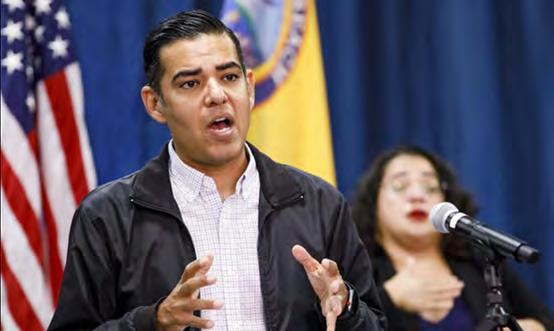
Garcia will be the first openly gay immigrant to serve in Con gress. Born in Lima, Peru, he moved to the U.S. at age five.
“Hey everyone, my name is Robert Garcia and we are going to Congress,” he tweeted.

Ever since he finished first in the June primary, Garcia had been fa
American, easily took first place in his House District 39 race Tuesday with 60.4% of the vote against his Republican opponent Aja Smith.
A third gay member of Con gress could join them, as former federal prosecutor Will Rollins has a strong showing in his bid to oust from office conservative Trumper Congressmember Ken Calvert (RCorona). According to the unoffi cial returns, Rollins is at 56.5% of the vote, while Calvert is at 43.5%.
With the LGBTQ retirement and tourist mecca of Palm Springs drawn into the new district, Cal vert faced a decidedly different electorate than he had in past rac es. LGBTQ groups rallied around Rollins and ran ads in support of his candidacy.
Three other out Southern Cali fornia House candidates appear to have fallen short in their races.
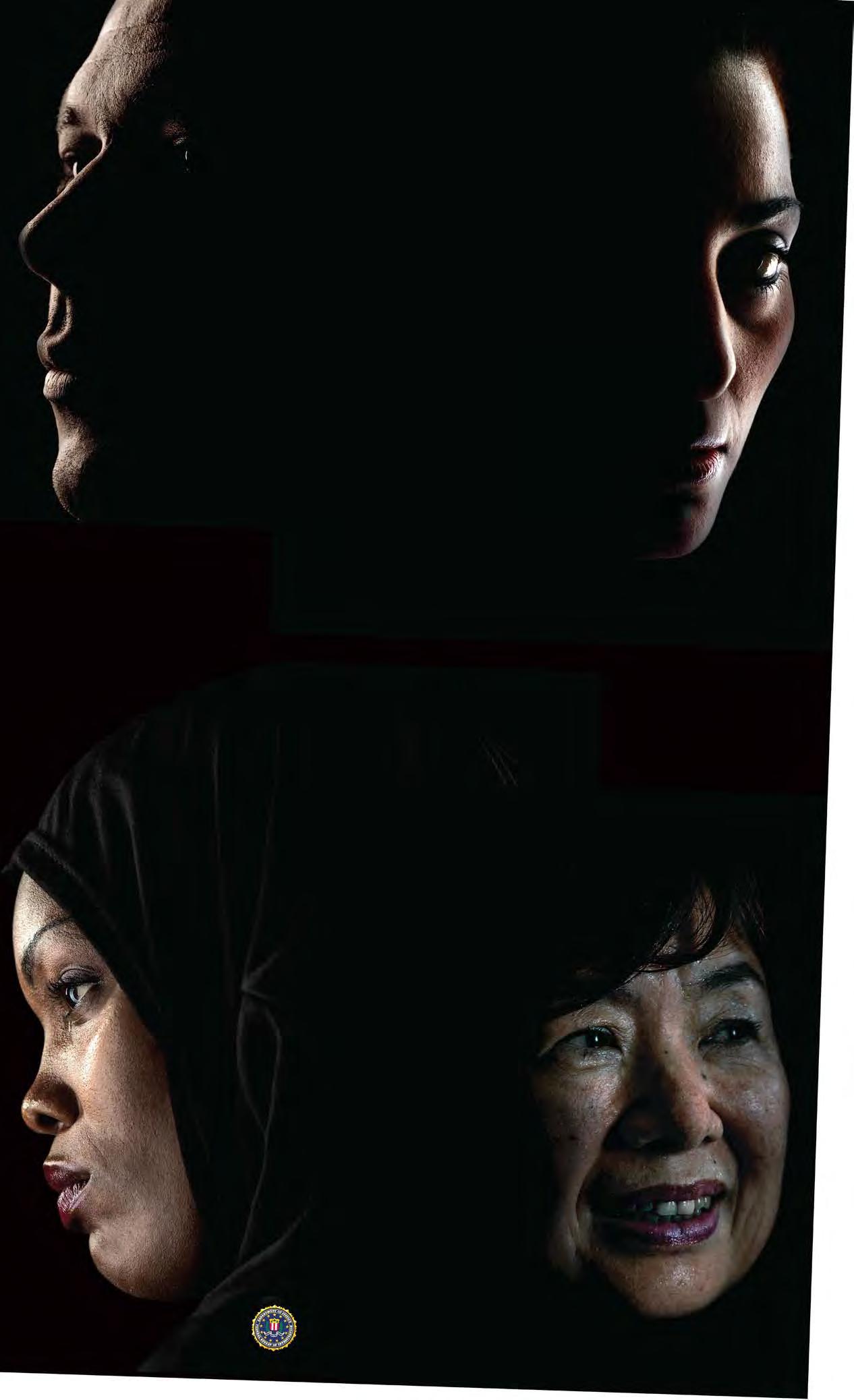
Gay progressive Democrat Derek Marshall, with 47% of the vote, is trailing Congressmember Jay Obernolte (R-Hesperia). He cur rently stands at 53% of the vote in their High Desert 23rd Congres sional District east of Los Angeles.
G “Maebe A. Girl” Pudlo, a nonbinary drag queen elected in 2019 as the at-large representative for the Silver Lake Neighborhood Council in Los Angeles, fell short in their attempt to oust Congress member Adam Schiff (D-Los An geles) for the state’s 30th Congres sional District. Schiff is sailing to reelection with 74.2% of the vote compared to Pudlo’s 25.8%.

In the rematch between Con gressmember Jimmy Gomez (DLos Angeles) and gay lawyer Da vid Kim (D), who lost to Gomez in 2020, it appears Kim has again fallen short. He was at 46% of the vote while Gomez was leading with 54%.
In the other West Coast con gressional race with an out can didate, lesbian former Santa Clara City Councilmember Jamie McLeod-Skinner is in a tight race for Oregon’s open, newly drawn 5th Congressional District. She is in second place with 47.6% of the vote, while her Republican oppo nent Lori Chavez-DeRemer has 52.4% of the current vote tally.
The progressive McLeod-Skin ner, who had run for a U.S. House seat in the Beaver State in 2018 and lost, this year had defeated moder ate Congressman Kurt Schrader (D-Canby) in the June primary to advance to the fall ballot. But with voters’ growing concerns over crime and Democrats’ handling of the economy, McLeod-Skinner faced strong headwinds in the general election.
If elected, McLeod-Skinner would be her state’s first LGBTQ House member and the first les bian from the West Coast serving in Congress. Of the current 11 LG BTQ members of Congress, only three are lesbians. t
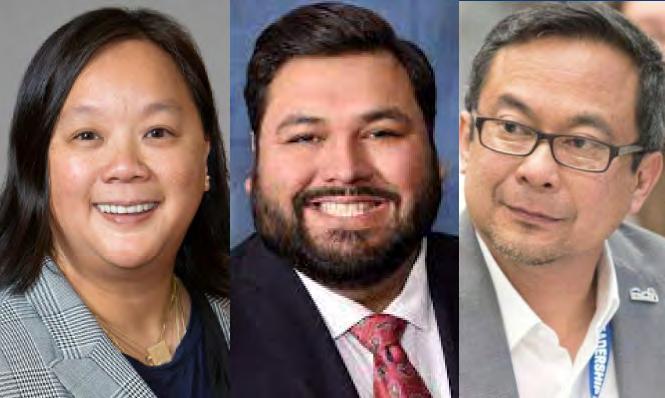 by Matthew S. Bajko
by Matthew S. Bajko
L GBTQ city council candidates from Richmond to San Lean dro in the East Bay await final vote tallies in their races. Several could become the first out members elected to their municipal govern ment bodies.
Not having to sweat out election night was gay San Leandro City Councilmember Victor Aguilar Jr., who sailed to another term with 100% of the vote. He was unop posed for his District 3 seat but still appeared on the ballot.
Seeking the Alameda County city’s District 1 council seat was Celina Reynes, a bisexual third generation resident of San Le andro. The educator was in first place with 46.50% of the vote, ac cording to the unofficial returns.
With gay Dublin City Council member Shawn Kumagai depart ing, as he ran for state Assembly rather than seek reelection to his council seat, lesbian council can didate Lynna Do aimed to main tain out leadership in the city. One of three candidates, including in cumbent Councilmember Jean Jo sey, running for two council seats, Do is in third place with 21.49%
of the vote.
In Union City, bisexual resident Kristy Boer is in second place with 29.49% of the vote in the threeperson contest for the open Dis
trict 3 seat on the City Council. Should she win, Boer would be the first known LGBTQ person to serve on it.
In Alameda, gay former city
councilmember Jim Oddie sought reelection two years after vot ers bounced him off the island city’s governing body. One of five candidates along with incum
bent City Councilmember Tony Daysog running for two council seats, Oddie was in fifth place with 14.44% of the vote.
Gay Richmond resident Ce sar Zepeda this year again sought election to his City Council in Contra Costa County. He is trail ing his two-person race for the open District 2 seat with 46.60% of the vote.
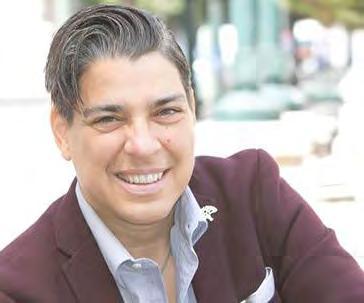
Looking to join him as the Dis trict 4 councilmember was Jamin Pursell, who is nonbinary and queer. One of two people seeking the open seat, Pursell is in second place with 31.81% of the vote.
Gay El Cerrito City Council member Gabriel Quinto, currently serving as mayor, easily secured a third term with 35.90% of the vote for second place in the three-per son race for two citywide council seats. Meanwhile, lesbian former San Francisco Pride committee president Carolyn Wysinger is in first place with 36.85% of the vote.
And queer candidate D’Marco J. Anthony lost his underdog cam paign to oust longtime Concord City Treasurer Patti Barsotti. He landed in second place with 21% of the vote. t
Rebecca Kaplan, the butch lesbian Oakland City Coun cilmember who was hoping to become the first out member of the Alameda County Board of Supervisors, was trailing in early returns Tuesday night.
In Contra Costa and San Mateo counties, a gay man and a lesbian were also seeking seats on their county boards.
In Alameda County, Kaplan was trailing with 44.92% of the vote. Former Alameda City Councilmember Lena Tam was leading with 55.08%, according to unofficial returns.
Kaplan has served as the atlarge representative on the Oak land City Council since being elected in 2008. She is currently vice mayor.
The supervisorial district in cludes the cities of Alameda, San Leandro, a portion of Oakland, and the unincorporated commu nities of San Lorenzo, Hayward Acres, and a portion of Ashland. It became open after former su pervisor Wilma Chan was killed by a motorist while walking her dog in Alameda last November.
Chan’s former aide, Dave Brown, was appointed by the board to serve out the remaining 14 months of Chan’s term through January 2022. He said he would not run for the seat.
In a phone interview earlier this year, Kaplan talked about the im portance of serving on the Board of Supervisors, which oversees a nearly $8 billion county budget, though not all of the money is “flexible,” as Kaplan put it, mean ing it must be spent on specific items as opposed to being part of the general fund.
“Particularly with how funds for the homeless flow from the state to the county, we’re not see ing sufficient coordination be cause a lot of money goes through the county to cities,” she said.
Kaplan had broad support in the LGBTQ community. She was endorsed by Equality Califor nia, the statewide LGBTQ rights group; the East Bay Stonewall Democratic Club; and the LG BTQ Victory Fund. This summer, she and her wife, Kirthi Nath, a queer woman of color, welcomed their first child.
The Alameda County Board of Supervisors has not had an out
LGBTQ person on it. Gay for mer Hayward city councilmem ber Kevin Dowling ran for the District 2 seat in 2010 but lost to Nadia Lockyer, who resigned in 2012 while undergoing treatment for chemical dependency.
“I would be the first-ever open ly LGBTQ supervisor,” Kaplan previously told the B.A.R., add ing that it was “kind of astound ing” that the Alameda board has not had an out member. “San Francisco first had one in 1978,” she noted, referring to slain gay supervisor Harvey Milk, who was also the first gay person elected to office in California.
In San Mateo County, lesbian Laura Parmer-Lohan was trailing her opponent, Menlo Park City Councilmember Ray Mueller, for the District 3 seat on the Board of Supervisors. Parmer-Lohan, a married mom, was elected to the San Carlos City Council in 2018.
Parmer-Lohan had 35.72% of the vote, while Mueller was at 64.28%, early returns showed.
If she prevails, Parmer-Lohan would be the first lesbian on the San Mateo County Board of Su pervisors. The board has had gay men on it, including former state Assemblymember Rich Gordon and former Project Open Hand executive director Tom Nolan, who later was hired as manager of special projects for San Fran cisco’s Department of Disability and Aging Services. Nolan retired in August.
Parmer-Lohan was endorsed by EQCA, the San Mateo County Stonewall Democrats, and the Victory Fund, as well as many other progressive organizations.
Over in Contra Costa County gay candidate Ken Carlson was leading in the race for the open District 4 seat on the Board of Supervisors. A member of the Pleasant Hill City Council, Carl son was running against Debora Allen, an elected member of the BART board of directors.
Preliminary returns showed
Carlson with 56.13% and Allen with 43.87%.
Carlson
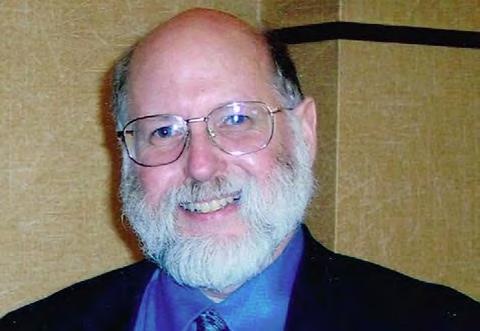
Born in Plymouth, Massachusetts, Stephen was an advocate for peace and minority rights.
Active in Quaker organizations, Stephen worked for the American Friends Service Committee for 33 years. He volunteered with the Friends Committee on National Legislation, served on the Board of Pendle Hill, and was a member of Strawberry Creek Friends Meeting.
Stephen served on the Boards of the Martin de Porres soup kitchen, The Family Link, AIDS Emergency Fund, Home Care Companions, the Japan-U.S. Community Education & Exchange, and Volunteers in Asia. He organized speaking tours for atomic bomb survivors, collaborated with Japan-based nonprofits, and worked to preserve the history of the internment of JapaneseAmericans.
Stephen was predeceased by his partner Daniel Joseph McTague in 1985 and his husband Brian Timothy Mailman in 2019. He is survived by his sister Stasia Linynsky and a host of nephews and nieces.
Thanks to the caring staff at San Francisco General Hospital and Kaiser Hospital.
A celebration of life will be held in Berkeley on Saturday, November 19, at 1 p.m., with a Zoom option. For details, please email nov.19th@strawberrycreekfriends.org.
Members of the Castro Mer chants Association and gay District 8 Supervisor Rafael Man delman seem to agree that the recent Lesbians Who Tech con ference has outgrown the LGBTQ neighborhood and should look to hold future events elsewhere in San Francisco.
The merchants had a robust dis cussion of the conference at their November 3 meeting, which was held in-person at the Academy and virtually.
Mandelman said that while Les bians Who Tech, which was held October 12-14 and drew upward of 3,000 queer people in tech and their allies to the Castro, was po tentially a benefit, it impacted many businesses. Most of the crit icism was around the fact that Les bians Who Tech organizers erected fencing along Castro Street, shut ting down the busy thoroughfare to vehicle traffic.
“It’s potentially a benefit, but they can’t do it that way again,” Mandelman said. “The engage ment with the area will have to be different. I have my doubts with the footprint.”
One merchant said the Castro Street closure “was terrible” for his business, which he estimated was down 20% and “directly related to the conference.” Another meet ing attendee said it was “not ideal” to block Castro Street and noted their deliveries “were ridiculous,” an apparent reference to vendors

From page 9
at that point. She said there was “still a small chance we can pull it off” as more votes come in.
“We are not going to know the final outcomes until tomorrow or the day after tomorrow,” predicted Mahogany.
Mayor London Breed tapped Dorsey to succeed former supervi sor Matt Haney, whom Mahogany had worked for at City Hall, after he departed in the spring for the state Assembly. Should she be elected, Mahogany would also be the city’s first queer and first non binary supervisor, and would also be the first-ever trans county su pervisor in California.
The race will be decided by the city’s ranked-choice voting system due to there being four candidates. Longtime Black transgender advo cate Ms. Billie Cooper is in fourth place with 2.26% of the vote, while Black labor leader Cherelle Jackson stands at third place with 3.57%.
“I feel pretty good,” Dorsey told the B.A.R., adding that, “I am not sure what else is out there to come in” when asked about his expecta tions for how the vote count could shift as more ballots are tabulated. He said his message about need ing to tackle the open-air drug dealing and overdose deaths on the city’s streets had resonated with voters and helped propel him to leading in the race.
“It is not an issue of the month for me,” said Dorsey. “It is an obli
not being able to access shops.
Members said that outreach by Lesbians Who Tech was not what it had been in the past. The orga nization last held its conference in the Castro in 2019, before the COVID pandemic. Last month’s return was the first time in three years the in-person event was held in the LGBTQ neighborhood, Les bians Who Tech founder and CEO Leanne Pittsford said during the conference, as the Bay Area Re porter previously reported.
The B.A.R. also reported last month that Castro Merchants Association co-President Dave Karraker said that overall, he was pleased with the conference and that he received few complaints.
But Patrick Batt, who owns
Auto Erotica on 18th Street, ref erenced the letter to the editor he had written to the B.A.R. last month that was critical of the gathering. “Touting being inclu sive in nearly all its branding, the recently departed Lesbians Who Tech conference in the Castro ap peared to be anything but,” Batt wrote in his letter. “This began with the overnight Monday erect ing of fencing with tarps blocking all views outside of its footprint of the 400 and 500 blocks of Castro Street. Thus, with the presence of security guards and uniformed San Francisco Police Department officers, the public right of way was limited to admission by only those people who had paid $700 to $1,200 for that exclusive privilege.”
Batt also referenced that last spring, Lesbians Who Tech rep resentatives addressed the mer chants group about the event and sought the group’s approval for closing Castro Street but “without many of the details,” he wrote in his letter.
“They’ve clearly outgrown the Castro, and good for them,” Batt said at the meeting. “The fences made it seem like an armed camp.”
One idea raised was for Lesbi ans Who Tech to hold its event at a larger facility, like Moscone Cen ter, and then have some events in the Castro.
As the B.A.R. previously re ported, Audrey Joseph, a lesbian and producer with a long his tory of working in the Castro and other LGBTQ events, addressed the merchants’ group March 3 with some plans for the confer ence. Parking was a major concern among business owners. At that meeting, Joseph, a former member of the San Francisco Entertain ment Commission, laid out the plan for reserving parking on the street and in the parking lots be hind the Castro Theatre and Wal greens, with its entries at 18th and Collingwood streets. She identi fied areas where unloading and reloading the trucks for setting up and tearing down the event would take place, as well as described the plans for a closure of 18th street at the Castro intersection.
But that didn’t seem to happen at the actual conference. Mandel man said November 3 that “Au
drey is in no way responsible for what happened at Lesbians Who Tech.”

In an email, Joseph wrote that she parted ways with Lesbians Who Tech shortly after that March 3 Castro Merchants meeting.
“I can’t really comment [as] I have little knowledge of what they did – Leanne and I parted ways in late winter/early spring 2022 – I do know that because of the par klet situation in the Castro they could not use 18th Street as they did before nor were many of the merchants willing to lease them their bars or restaurants – I was amazed that they got all of Cas tro Street from Market to 19th,” she stated. “I also know that they did not use any of my vendors nor my designs – I did not attend the event so I know nothing just what people have told me – some of the attendees and some of the mer chants.”
Pittsford did not respond to a message seeking comment.
Mandelman said that he has contacted Jeffrey Tumlin, a gay man who is director of the San Francisco Municipal Transporta tion Agency, to discuss his con cern that closing down Castro Street for that length of time “is just not good.” He also suggested it might be a good idea for mer chants group representatives to meet with SFMTA.
SFMTA spokesperson Erica Kato responded that the agency’s Interdepartmental Staff Commit tee on Traffic and Transporta
AD 78 race, Ward garnered 67%.
Joining them will be Corey Jack son, a gay man and the first LG BTQ African American elected to the state Legislature. He won the Assembly District 60 seat in the state’s Inland Empire with 57% of the vote.
Also set to serve in Sacramento is Rick Chavez Zbur, the gay for mer executive director of state
gation of my survival and nothing will stop me from working on it.”
A tough on crime message seemed to help Engardio be on the precipice of defeating a sitting su pervisor, Mahogany noted during her party remarks.
“Right now in San Francisco we are seeing unprecedented things. On the other side of town a sitting supervisor may be unseated,” she noted. “It speaks clearly where the voters are at. We are seeing people be very concerned about safety and looking for a tough on crime message.”
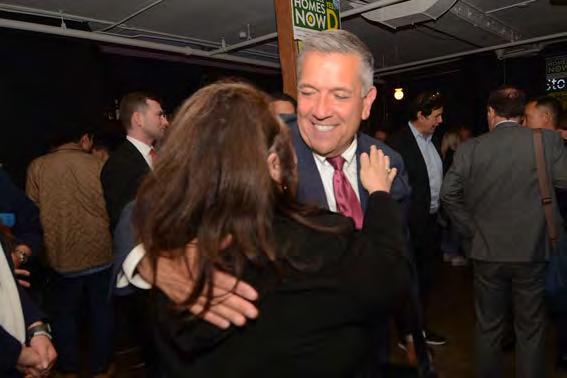
Asked about the prospect of serving alongside two out supervi sors as he joined Dorsey’s election watch party Tuesday night, Man delman told the B.A.R., “I will be delighted, but I don’t think it is
wide LGBTQ advocacy organiza tion Equality California. He won the race for the open Assembly District 51 seat in Los Angeles with 56% of the vote.
In the race for the newly drawn 20th Senate District seat, lesbian social worker Caroline Menjivar and gay hotel manager Daniel Hertzberg are vying to become the first out state legislator elected from the San Fernando Valley. The winner will succeed Hertzberg’s father, state Senator Bob Hertz
over for Gordon at all.”
District 10 Supervisor and board President Shamann Walton easily won reelection with 70% of the vote. His opponent, Brian Sam Adam, received 29.84%.
“Serving as your District 10 su pervisor and as president of the Board of Supervisors has been one of the highest honors in my life,” stated Walton. “When I launched my reelection campaign, I vowed to advocate for the most vulner able, the most overlooked among us, and fight to make San Francis co a better, more livable place for every one of us.”
Having been unopposed, Dis trict 2 Supervisor Catherine Ste fani cakewalked into a second term. She netted 100% of the vote.
“To the voters of District 2,
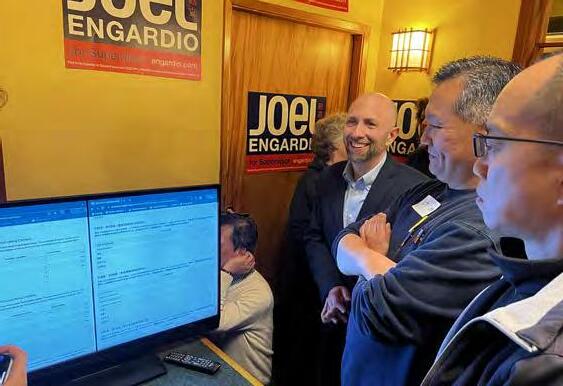
berg (D-Van Nuys), who is termed out this year.
Menjivar currently has the lead with 54.2% of the vote, while the younger Hertzberg has 45.8%.
Palm Springs City Council member Christy Holstege, who would be the first bisexual female LGBTQ caucus member, ran for the open Assembly District 47 seat against Republican Greg Wallis. Former GOPer Assemblymember Chad Mayes (I-Rancho Mirage) opted against seeking reelection to
the newly drawn seat.
Holstege is leading with 57.2% of the vote, while Wallis currently is at 42.8%.
Gay Chula Vista City Coun cilmember Steve Padilla secured election to the open Senate Dis trict 18 seat in San Diego County with 59.6% of the vote. In the nearby 40th Senate District race, gay veteran Joseph C. Rocha of Escondido is losing with 46.5% of the vote.
He is attempting to oust from
office state Senator Brian Jones (R-Santee). One of nine current GOP Senators, Jones has 53.5% of the vote.
No matter what happens in the various races, the state Capitol is set to have the largest contingent of LGBTQ legislators in California history. Since its creation in 2002, the LGBTQ caucus has had at most eight members at one time. t
Whetherout singer-songwriter Amy Ray is performing with longtime musical partner Emily Saliers as one half of the Indigo Girls –as she has since the mid-1980s– or going solo as she did with her solo debut “Stag” in 2001, you can recognize her instantly.
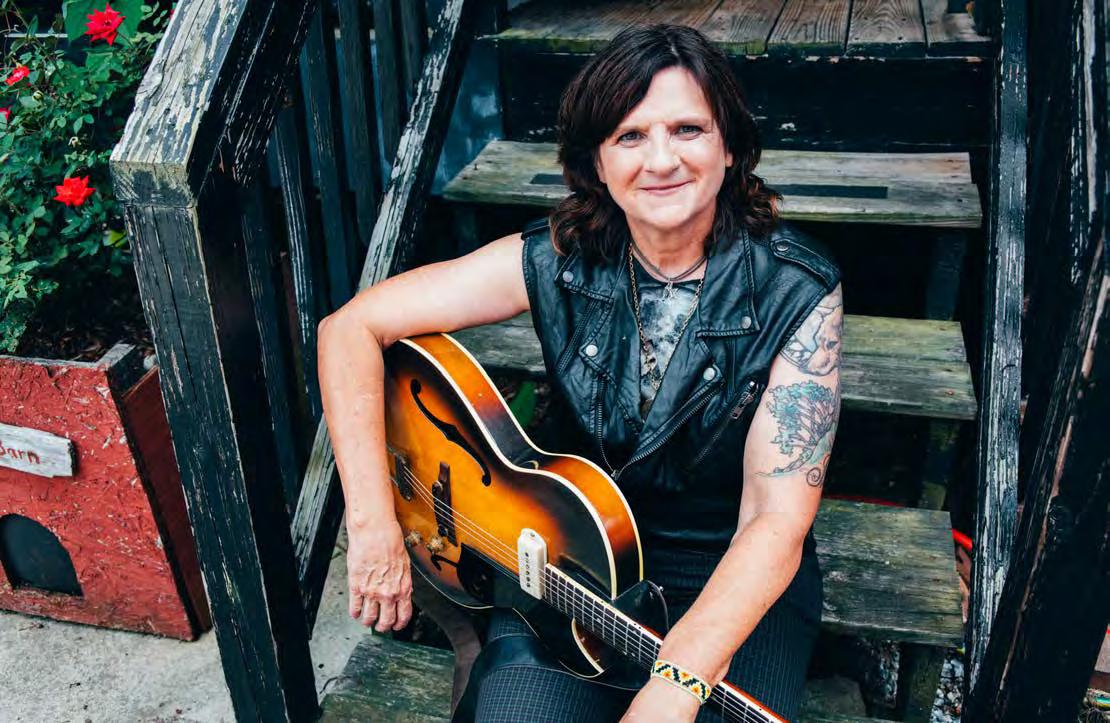




Her distinctive vocal style, which suits what ever genre she’s performing –folk, punk, Ameri cana, or gospel– has become as much her trade mark as the outspokenness of her lyrics. “If It All Goes South” (Daemon), Ray’s exceptional seventh solo album is a welcome addition to her singular output, touching on themes of queerness and social issues, all performed in her warm and welcoming manner. Amy was gracious enough to make time to talk about the new album around the time of its release.
Gregg Shapiro: Your 2001 solo debut album, “Stag,” and its 2005 follow-up, “Prom,” are firmly rooted in a punk rock/ riot grrrl aesthetic. While the Indigo Girls are more than capable of rocking out, did you feel that the songs on those albums wouldn’t have been a good fit for what you do with Emily (Saliers)?

Amy Ray: Yes. I think it was because of two things. One was the collaborators. Those were people I’m a fan of, most of them are people that Daemon Records (Ray’s record label) had an as sociation with, in some way or another. It was kind of like this other camp of people that were different from the collaborators that the Indigos would typically play with. It tended to be more studio accurate, in some ways. As opposed to that punk rock ethic which is music being from a different place, and accuracy maybe being less important than technical prowess.
A little more DIY.
Yeah! And I also think the subject matter, the songs were just a little more singular in a way that was hard to do them as the Indigo Girls and not dilute the message. As soon as you get us together, we really shift the other person’s song, it becomes a duet. The subject matter to me was so specific and gender queer and punk rock edge, that it didn’t feel like it would work. At that time, when I wrote (the song) “Lucy Stoners,” Emily wasn’t in terested in doing some of those songs. She wasn’t down with the attitude.
Now, she would say, I’m sure just knowing her, that [laughs] she’d do it now. Because her at titude has changed. I was hanging out with and influenced by people that were from that DIY movement, and there was lots of gender-queer conversation. It was a different place than Emily was in as a gay person. Emily can play any song [laughs] and I know. Now, I look back on all of it and I think I was, all the time, reaching around to different collaborations because I love collab
orating with different kinds of people. It always teaches me something. It’s also a different itch that I get scratch.
Your most recent three solo albums –2014’s “Goodnight Tender,” 2018’s “Holler,” and the new one, “If It All Goes South” – in addition to being alphabetically titled, feel like an Americana trilogy. Do you consider them to be linked?
Yeah. I mean I didn’t say to myself, “This is the third one and then I’ll stop.” But “If It All Goes South” was definitely a record where there was a thread from the other ones and some things that I wanted to achieve that I didn’t feel like I was able to do on the other ones. I think I didn’t even know that until we started making this one.
This is more successful at combining a few of my punk-abilly influences into an Americana world. Also, some of that spontaneity we were starting to get on “Holler.” Now that we’ve played together as long as we have as a band, it was at
its peak on this record. I think we just needed to make a couple of records to get to that place.
I like them all, but for different reasons. They do different things for me. This one gathers up all the loose ends of “Holler” and “Goodnight Ten der” musically and ties them up and puts them in a different context, and almost raises the bar.
Lyrically, I wanted to have songs that were about healing, a “you’re not alone” kind of vibe, because of the time period that we had just been through. It’s also the same producer (Brian Speiser) on all three, and we’ve worked together on projects.
It started off casually – “Hey, I’ve been wanting to do this country record with these songs. Let’s do this together.” We also had Bobby Tis, who had engineered the last one, and mixed this one. That made the whole experience like a closed loop in a good way. Because he engineered and mixed it, he got to bring his own sounds to fruition.
On Indigo Girls and her seventh solo albumWe also went full-tilt on the tape, where the last two records we had, for budget reasons, had to transfer every thing to Pro Tools and then mix in a Pro Tools session, and then transfer it back to half-inch tape. Trina (Shoe maker) did that. But this time we mixed to tape.
Am I reading too much into the album’s title “If It All Goes South,” or is it a play on words, as in “goes south” as a direction and as deterioration?
You’re not reading too much into it. There’s even more you can read into it, politically. When I was writing (the song) “Chuck Will’s Widow,” Georgia was the epicenter of some big political movement. When Warnock got elect ed and Abrams declared running for governor again, I was like, “Oh man, I’m in the right place for once.”
But we knew it wasn’t always go ing to be easy. My perspective in that song was a couple things. “If it all goes South, count it as a blessing, that’s where you are.” Yes, it’s directional, and also like, if things get really shitty, try to make the best of it, of course, it’s what you tell your kids all the time.
“Subway” ends with the line “This Georgia girl has got it bad for New York.” With that in mind, could there be an Amy Ray or In digo Girls musical on Broadway at some point in the future?
[Big laugh] That’s Emily’s terri tory. She’s working on some things. A couple of different musicals, and I’m
not working on them with her. She’s developing two different ones, and I think one of them has actually gotten some traction and some workshop ping that’s pretty important.
There is a musical that a friend of mine from high school has been writ ing that’s really interesting and it’s got ten a lot of workshops. It’s still in the early stages. It uses Michelle Malone’s
music and my solo music. Then there’s a movie coming out called “Glitter and Doom” which is a movie musical that’s just Indigo Girls music. It’s coming out next year, I think. We’re still working on the final credits song.
After the current Indigo Girls tour wraps up, is there a possibil ity of an Amy Ray solo tour?



Yeah. We’re booking dates in Febru ary for the South. I’ve tried touring in cold places in February, and it’s hard [laughs]. We’ll head up to the North in May.t

www.amy-ray.com www.youtube.com/user/amyray music
Read the full interview, with music clips, on www.ebar.com
From page 19
professional fallout, he emerged from the pandemic years with characteristic resolve and commitment.
The fortnight of concerts are not his first return to DSH since he stepped down, but loyal supporters and fans cannot help but worry he might be overdoing it. The trusted maestro still knows best and if hus band Joshua Robison says it is okay, let us all enjoy the reunion.
The programs are classic MTT, mixing the old and new with guest ap pearances by outstanding soloists.

Three performances – Nov. 11, 12 and 13 (matinee) feature French cellist Gautier Capucon in the SFS commis sioned U.S. Premiere of the Cello Con certo by film and concert composer Danny Elfman (anybody remember 1980s new wave band Oingo Boingo, the theme music for “The Simpsons,” or lots of Tim Burton movies?). Stravinsky opens the bill and Tchaikovsky closes it.


November 17-19 concerts include an all-Brahms program of Serenade No. 1 and Piano Concerto No. 1. Pia nist Emanuel Ax (a regular onstage partner with MTT) is well suited to the mighty First and the amiable Ser enade, chamber-sized with orches tral weight, will make good ballast. www.sfsymphony.org
Go for Baroque Philharmonia Baroque Orchestra welcomes Music Director Laureate
Nicholas McGegan back to the podium at several Bay Area venues conducting his 1,000th performance with one of his musical fortes –French Baroque dance music– November 16-20.

The program might sound a little too niche-audience for some, but the ever-engaging McGegan has been baptizing grateful newbies and mak ing converts for more than 35 years.
The elegance and rhythmic allure of Baroque music can prove irresistible, especially in the hands of a historically informed performance pioneer.
name, “The Surprises of Love.”
Nov. 16 at First United Methodist Church, Palo Alto. Nov. 18 at the Herbst Theatre, San Francisco.
Nov. 19, 8pm and Nov. 20, 4pm at First Congregational Church, Berkeley www.philharmonia.orgt
ers that he could look up to, nor did he have trans dancer friends or peers with whom he could commiserate or create work with. He was absolutely alone.
“It’s critical that we know our com munity’s history,” he said. “The reason that there are finally more than trans and non-binary dancers training and teaching and performing today is be cause of the very hard work and activ ism of all of us who were alone for so long.”
Dorsey described “The Lost Art of Dreaming” as “an evening of full throttle dance.” He promises that the audience will be exposed to intimate storytelling, and queer partnering and music.
“My hope is that our audiences will be moved, touched and transformed in some way by our work,” he said. “I hope audiences who experience this work will re-connect with their own deepest dreams and longings. Most of us grow up being told we don’t get to dream about our future, or that we won’t even have a future. This show is a danced manifesto that declares that dreaming is our birthright.”
All members of Sean Dorsey dance are queer. Some are gender non-con forming, some are trans, some are both, and some are non-binary. This is very important to Dorsey and to the creation of his work.
 by David-Elijah Nahmod
by David-Elijah Nahmod

Beginning November 18, Sean Dorsey Dance will commence their 18th season when their new concert, “The Lost Art of Dreaming”
“Dancing on stage in my trans body is always a political act,” Dorsey said in an interview with the Bay Area Re porter. “Declaring our trans and queer communities worthy of joyous liber ated futures is a revolutionary act.”
be subjected to hate and violence ev erywhere. Dorsey reports that he has been subjected to many attacks and harassment as a visible trans leader and artist.
“Sean Dorsey Dance counters this
we launch a tour next year to Seattle, Maui, Washington, D.C., Reston Vir ginia, Durham North Carolina, Mar tha’s Vineyard and more.”
Dorsey can remember a time when he was the only trans person in a
“I love dance with every fiber of my being,” he said. “For me dance is the most visceral form of expression. We embody emotion, story and humanity with every movement, every breath, every gesture and expression. People connect very deeply with the themes in my work precisely because it comes from the body. And specifically from queer and trans bodies.”t
It’s been 25 years since the San Fran cisco Transgender Film Festival first came into being. Over the years the festival has grown to become one of the most respected and best-known events in the trans community. Noth ing, not even the pandemic, would stop them, as the festival went virtual during the lockdown.


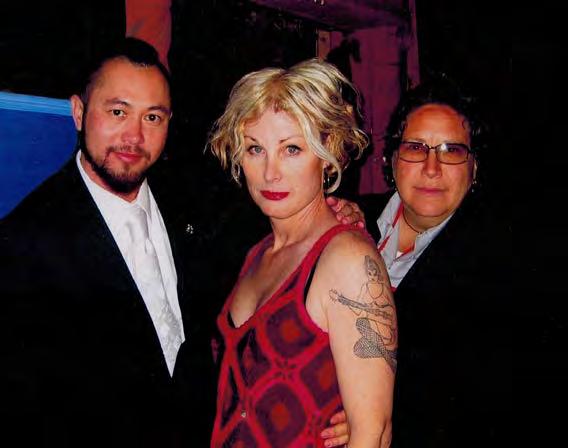
This year the festival returns to in person for two days worth of screen ings at the Roxie Theatre. But the festi val will continue beyond that, screen ing films online for another week.
For Artistic Director Shawna Vi rago this milestone year is something to celebrate.
“This is our silver anniversary, and I think that’s a big deal,” Virago told the
Bay Area Reporter. “When we started it in 1997 by my friends Christopher Lee and Alex Austin, who knew we’d still be here 25 years later? Also, when I became Artistic Director in 2003, I didn’t know if we’d last more than a couple of years be cause funding was a real challenge then.”
This year’s festival offers a delight ful and diverse cross section of short films by transgender and gender nonconforming filmmakers. There are many highlights, but there are a few that stand out from the rest.
One of the more fascinating pieces is “The Beauty President” by San Fran cisco filmmaker Whitney Skauge. The film recalls the 1990s presidential can didacy of Joan Jett Blakk, the first drag queen to see her name on the ballot, made all the more historic because Blakk is Black. Throughout the film’s
running time Terence Alan Smith, Blakk’s male alter ego, recalls the cam paign with wit and good humor. Smith also recalls friends who died of AIDS. Film clips show Blakk campaigning, speaking eloquently about education and health care. At the time the media treated Blakk’s candidacy as a joke, but her wise and insightful words show that she is nothing to laugh at.
Another standout piece is “Ro & Shirelle,” which comes from Los Angeles-based filmmaker Adelina Anthony. Two trans best friends navi gate the often perilous journey many trans people are forced to endure for doing nothing more than trying to use a public restroom.
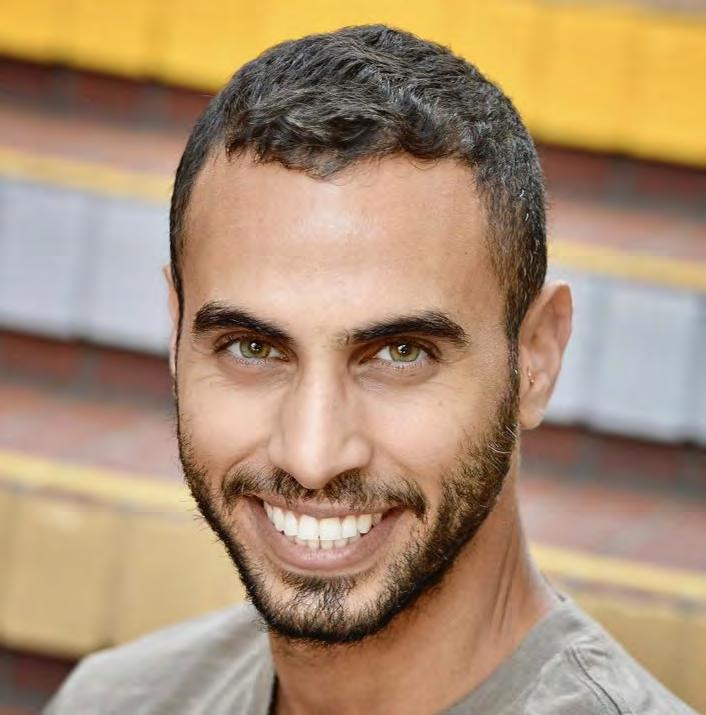
“I don’t think anyone thought we’d last,” Virago said. “There were almost no transgender arts organizations or
events when we started. I didn’t know if we’d last more than a couple of years because no one was funding us. It’s certainly a labor of love.”
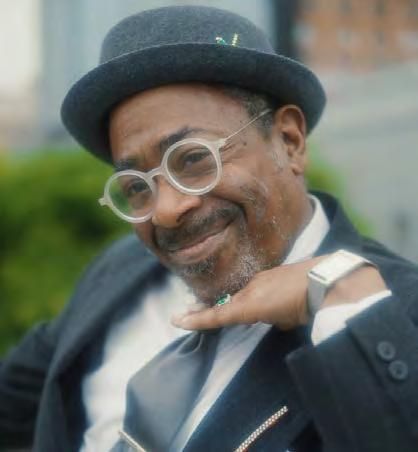
Virago added that she’s delighted to be back at the Roxie.
“We love the Roxie,” she said. “Like us, they’re keeping up the good fight. It feels wonderful to gather in person again, provided everyone wears a mask.”
One of the things that Virago is proud of is that the festival has con tinued its mission to embrace underrepresented voices and films with super-queer quirkiness.
“I see our festival as a haven for trans and gender non-conforming filmmakers to assert their wisdom and artistic brilliance,” she said.
Virago notes that more than 100 anti-transgender bills have been in
troduced in the United States this year alone. The trans and gender non-con forming communities are forced to deal with hate every day of their lives.
“I hope our audience can find re spite from all this, and can enjoy our films,” she said. “We have a range of genres from documentaries and poli tics to animation, dance, music, ro mance, coming of age tales and thrill ers. Our message is that despite the ongoing attacks against us we are pow erful, vibrant and make really amazing art. Plus, we’re super-cute.”
The San Francisco Transgender Film Festival will be at the Roxie Cinema, 3117 16th St., on November 10 and 11, and will continue online until Novem ber 20. All films are close-captioned for the deaf and hard of hearing. Ticket cost is sliding scale. www.sftff.orgt
The first word that comes to mind when we recall watching “My Po liceman,” the British drama, now avail able on Amazon Prime Video, is drea ry. And by dreary we are referring not only to its execution, but the context that forms the film. Yes, the movie pri marily occurs in the repressed 1950s in England, where homosexuality was still a crime for which many people went to prison, so themes of societal homophobia, secrecy, stigma, and discretion are bywords pervading this sad, frustrating chronicle. But these same stifling attitudes have crept into

how this story has been enacted, so the result is a guarded, pessimistic, stodgy film, whose chief fault is a lack of pas sion in a story that cries out for it.
Based on Bethan Robert’s superb acclaimed 2012 novel, the story is inspired by the unconventional 40year affair of gay English novelist E.M. Forster with Bob Buckingham, a working-class London police officer, including his happy marriage to nurse May Hockey.
Roberts reimagines the story in the 1950s as a fictional forbidden love af fair with two men, one married to a woman, all intertangled by their clashing desires. She then transports
the characters to 1999 to reveal how the past has irrevocably shaped their lives, despite changing social conven tions, in their final attempt to find happiness.
The movie opens in 1999 Brighton and the point-of-view is Marion (Gina McKee) who is taking care of her friend Patrick (gay Rupert Everett) who has suffered a stroke. Marion’s husband Tom (Linus Roache) refuses to have anything to do with Patrick. Finding and reading Patrick’s diaries spurs her own memories and there are flashbacks to 1957 when they all first met.
School teacher Marion (nonbi nary Emma Corrin, Princess Diana in “The Crown”) falls hard for cop Tom (Harry Styles), brother of a girlfriend. He gives her swimming lessons, but also through his job encounters artist/ museum curator Patrick (out gay Da vid Dawson) who exposes Tom, then later Marion, to the finer pleasures of life such as art, classical music and lots of high-end scotch. He recruits Tom to pose for a painting, essentially seduc ing the confused but pliant policeman. However, Tom still wants a wife and children with Marion. They marry, but he continues his intense affair with Patrick, the latter even tagging along on their honeymoon. Later Patrick will pay Tom to be his assistant on a working Italian sojourn to Venice, with Marion now suspecting he and Tom are more than friends.
Due to incriminating evidence sent to the police, Patrick is arrested on charges of public indecency and sent to prison despite Marion testifying on his behalf. Diary entries point the fin ger at Tom as his paramour, resulting in the loss of his job.
Directed by gay Tony and Olivier award-winning theater director Mi chael Grandage, there is a staginess to the proceedings, making one wonder if Robert’s book might not be more
effective as a play. The other culprit is the screenplay by gay Oscar-winning script-writer Ron Nyswaner (“Phila delphia”). The “Rashomon”-like analy sis on how memory is constructed by the clunky switching to and fro past and present dampens the impact of the 1950s action.
Also, it’s as if the two time periods aren’t speaking to each other, which isn’t helped by the realization that the 1990s actors, as good as they are, bear little physical resemblance to the 1950s analogs.
Harry Styles is a major reason for the film’s coldness and turgidity. In spite of being a charismatic concert performer, he brings none of that vi brant energy to the film. Perhaps he was instructed by Grandage to act repressed, but he never convinces audiences why either Marion or Tom would fall hopelessly in love with him.
Also, the accusations of Styles em ploying queer symbols in his onstage performances without explicitly claiming to be gay, fairly or unfairly, can’t be ignored. Styles doesn’t want to label himself publicly when asked by the press about his sexuality, ques tions which have persisted ever since his One Direction days. It is this am
biguity and ambivalence that might be hampering his performance. It is rath er crude, but true, to say, the best part of his Tom are the fleeting glimpses of Styles’s naked ass.
The trouble is that for all “My Police man’s” artistic stylishness (including its muted color tones), all the characters, with the exception of the younger Pat rick, appear restrained, detached, and don’t resemble real flesh-and-blood people. This lack of depth and inner fire create a type of at-a-remove quality resulting in an arid, static, inert film, so the audience can’t identity with any of the conflicts tearing apart the protago nists. And the plodding, dirge-like pac ing isn’t obliging.
Even though a bombshell explain ing much of the character’s motiva tions is revealed toward the end, it carries no emotional wallop. Unfortu nately, because feeling-wise we haven’t been invested in their plight from the start, the concluding resolution, which is supposed to be liberating, even heart-rending, comes across more like relief, either that the character’s tor ment might be coming to an end or more likely that this drab, dishearten ing two-hour film is finally over.t
Read the full review on www.ebar.com.
Luiz
Inacio Lula da Silva, the popular former president of Brazil, won the presidential election runoff on Oct 30. Lula received 50.9% of the votes to Jair Bolsonaro’s 49.1%. Hoping to inoculate his campaign against losing, but also re vealing his insecurity about being able to win again, Bolsonaro, like Trump, began crying foul before one ballot was cast. And although Bolsonaro refused to concede defeat or call to congratu late Lula for winning, he has, however, promised to follow the Constitution and begin the transition process.
Queer filmmaker Fernando Gros tein Andrade’s new film “Breaking Myths: the Fragile and Catastrophic Masculinity of Jair Bolsonaro” is a deep dive into the topic of what poli tics in Brazil has become since Jair Bolsonaro came to power. How does democracy work when the country is evenly split right down the middle? And what is to be done when those who hold the levers of power lose their sense of decency, descending McCar thy-style into reckless cruelty?
Bolsonaro first came to the public’s attention as a rank-and-file military man when he contacted a journalist to complain about military pay, and she published Bolsonaro’s sketches detail ing a plan to detonate a bomb in the men’s room of the military college, and another bomb to blow up water pipes supplying the city of Rio. For this, Bolsonaro was tried and convicted of plotting a terror attack. But the mili tary dictatorship had just ended and
the court had mercy on him, choosing to simply throw him out of the mili tary and give him a second chance.
The film contains tons of archival footage, a crash course of sorts in Bra zilian politics. To be sure, the director’s decision to include facts about his own interesting life in the film provides a fascinating contrast with Bolsonaro’s life. And it’s strange to realize the two men affect each other’s lives even with out knowing each other or interacting.

“Let’s machine gun the Workers’ Party!” Bolsonaro shouted on the mi crophone at a rally while holding what looked like a machine gun, then he pretended to shoot it into the air even though inciting violence is illegal and the television platform that broadcast it can be held liable.
“The Trump of the Tropics,” as he is called, is not ashamed to advocate child abuse on a political TV show, saying, “If your son acts gay, just beat him up and he’ll stop.”

Unlike the uplifting campaign songs of other politicos, Bolsonaro’s supporter sang “Watch out, Faggot. Bolsonaro is going to kill faggots!” in soccer stadiums all over Brazil to the beat of a manic drum line.
The film demonstrates the ter rible real-world impact of Bolsonaro’s stunts on the general public. When asked if LGBTQ people should be killed, the average man and woman on the street in Brazil answered oncamera, like sheep, yes, they should be. (If the question had been the in verse, I wonder if they all would have answered no, parroting whatever the questioner asked.)
With a straight face, Bolsonaro even claimed he was invited to a can nibal feast by Indians, but “no one wanted to go with him” so he did not go. Many wonder whether he had slipped into a delusional state of mind or if he was pulling the jour nalist’s leg. Either way, the lie was vociferously denied by the Indian tribe he named. Furthermore, the tribe emphasized that in their entire history they have never engaged in cannibalism. Bolsonaro also claimed that a Lula supporter, one lone sup porter, is a Satanist.

Andrade’s ability to sift through all the noise of the political climate to put his finger on the one most important thing here is what makes the film very much worth watching:
this really is about male wounding, in this case the childhood trauma of losing his father and his attempts to heal it by immersing himself in the world of horticulture by growing orchids.
We suspect that the hyper-mascu linity and cruelty Bolsonaro displays results from male wounding in his
life as well, although undisclosed. Sensitivity turned inside out, inflict ing on the world what they have not been able to heal within themselves. The full documentary is available at www.breakingmyths.comt
Read the full review on www.ebar.com
Y
ou can build a compact, powerpacked little library of books translated for the first time into Eng lish and released by Semiotext(e) this fall or in recent years. Each work seems to touch the vast cosmos of French arts and letters through the minds of radicals that shook thought and literature to its foundations.
First, “Hervelino” by Mathieu Lin don. Translated by the gifted French to English languages translator Jef frey Zuckerman, who has dedicated himself to translating Hervé Guibert and Jean Genet.
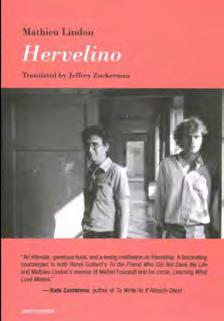
“Hervelino: the word slipped into my throat.” Thus begins a book that leads us into a relationship marked by love and ultimately illness and death. “Hervelino” remains a loving tribute, a deep meditation on the meaning and dimensions of friend ship at a time when gay men faced the specter of death by HIV/AIDS.
“Hervolino” reveals Guibert in the early 1990s towards the end of his life. Guibert is remembered as hav ing changed French public attitudes towards HIV/AIDS, and who himself died of AIDS in 1991.
We meet Lindon with Guibert in Rome where, between 1987 and 1989, both won artistic scholarships at Villa Medicis, experiences which are recollected in the pages of this incisive novel

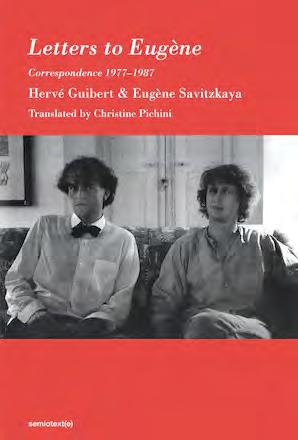
Lindon’s memoir acutely observes the accounts of not only Guibert but also poet and novelist Eugène Saviatsky; and more distinctly, phi losopher Michel Foucault who, aside from having established himself as one of the 20th century’s most im portant historians of ideas, was an immensely important political activ ist. Having examined the relationship between power and knowledge and how they are used as a form of social control, Foucault altered our other wise limited view of existence within civilizations.

In meeting these writers, we meet the intimacy of the gay male mind
when focused on the finest of details inter connected in the pow erful bond of queer ness more directly sewn together in the manner of borderless ness; with freedom ex alted in the unspoken text and that, in fact, separates gay men from others of our species, we meet how gayness is a lesson in surviving especially when otherized.

Lindon’s craft mar ries itself to another of his books: “Learn ing What Love Means” (Semiotext(e) 2017), translated by Bruce Benderson. A book that divinely func tions in the company of “Hervelino,” so inti mately that a contigu ous reading of these two important novels is like sex: their subject matter raises Foucault and Guibert from the dead and captures some of the essence of Guibert’s own books, “To the Friend Who Did Not Save My Life” and “Written in Invis ible Ink,” both pub lished by Semiotext(e) 2020.
To this collection I would add “Love Me Tender,” by Constance Debré, released this past September. Lauded by genrebusting American writer born in San Francisco Maggie Nelson as, “…des tined to become a classic of its kind,” Debré’s writing has been compared to both Guibert and Camus. All the above books are intense, leaving the reader blown away by what comes after.
Intensity, undeniably coupled with
passion, equips the reader with the mo tivation to dive into looking more genu inely at freedom in relation to truth, tell ing the truth, and to whom you tell it.
In France you can expect the truth; truth-telling is a na tional pastime. Guib ert told the truth so boldly that it scares you. Debré tells the truth hauntingly where she is never clouded by having been born into an il lustrious French fam ily where her father was a prime minister. Rather, she is radical, leaving a secure ca reer as a lawyer and her straight marriage to pursue the life of an impoverished writer, writing full time and engaging in lesbian affairs with multiple partners.
Out of which, she has to legally defend herself in order to preserve a semblance of custodial rights with her young son. Her ex-husband re tains full custody while Debré’s rights are diminished to biweekly, supervised visits. Victim of her husband’s accusations of Debré’s pedophilia, a false accusa tion, the story, fraught by tensions but never pretensions, exhibits the author’s rare talents that sing in an arena of exhilaration.t
www.semiotextes.com
Read the full review on www.ebar.com
